UK Customs Regulations - What Can You Bring Into the UK?
:max_bytes(150000):strip_icc():format(webp)/FerneArfin-5b6f00c446e0fb0050324e74.jpg)
Christopher Ames / Getty Images
The withdrawal of the United Kingdom from the European Union (a move known as "Brexit") formally occurred on January 31, 2020. Following that departure is a transition period lasting until December 31, 2020, during which the U.K. and E.U. will negotiate the terms of their future relationship. This article has been updated as of the January 31st withdrawal, and you can find up-to-date information about details of the transition on the U.K.'s government website .
The last hurdle before entering the United Kingdom is passing through HM Customs & Excise. It's really not very complicated as long as you obey a few simple rules.
Going through customs can be faster than you might expect. European Union (EU) countries use three "channels" for customs processing. If you arrive from another EU country, whatever passport you hold, choose the Blue Channel once you've collected your luggage. Arriving from outside the EU, choose either the Green Channel - if you have nothing to declare based on the allowances outlined below - or the Red Channel, if you have goods over the duty free allowance.
The whole thing is based on an honor system. But keep in mind that, though it doesn't happen often, you can be stopped for a spot check in the Green or Blue Channels, and the penalties for breaking the law are pretty stiff. If you are careful about following the rules, passing through customs should not take very long. Since passport and immigration checks for non-UK citizens (and at the moment non-EU citizens) can be a time consuming ordeal during busy vacation seasons, you'll be grateful for a quick passage through Customs.

What You Can Bring Duty Free From Outside the EU
Here are the latest Duty Free Allowances that apply if you arrive in the UK on a transatlantic flight or from anywhere outside the EU:
- tobacco products for personal use - 200 cigarettes, or 100 cigarillos, or 50 cigars, or 250g of loose tobacco. As of December 1, while allowances remain the same, you can make up your duty free allowance from a mixture of tobacco products. For example, 100 cigarettes, and 25 cigars would meet the tobacco limits.
- 4 litres of still table wine
- 1 litre of spirits or strong liqueurs over 22 per cent alcohol by volume, or 2 litres of fortified wine(such as port or sherry), sparkling wine or other liqueurs.( As with the change in tobacco allowances, you can now make up your alcohol allowance from a mix and match of alcohol products.
- 16 liters (or 28 imperial pints) of beer
- £390 worth of all other goods including gifts and souvenirs.
- If you arrive by private plane or boat, your duty free allowance for "all other goods" is reduced to £270.
The tobacco and alcohol allowances only apply if you are over 17 years old. You can bring more than the allowance for these in for your own personal use but you have to pay duty on anything above the allowance.
You can also bring in personal effects reasonably required for your journey, including clothing, toiletries, personal jewelry and other clearly personal articles.
How Much Duty?
If you have to pay duty, the rate on goods up to £630 is 2.5% of the value - and if any single item is worth more than your entire duty free allowance, you will pay that percentage on the entire value, not just the amount over your allowance. For goods worth more than £630, the amount of duty will depend on what the goods are. You can find out more about this by calling the VAT, Customs and Excise Helpline on +44 2920 501 261 from outside the UK. You may also have to pay VAT Import tax on amounts over your duty free allowance. The VAT rate is currently 20% for most VAT-able goods.
What You Can Bring From Within the EU
Customs and Excise staff exercise a certain amount of judgement over what you can bring to the UK from within the EU. There is no limit to the amount of taxable goods you can bring from most EU states. But you may be stopped if you bring back large quantities of alcohol and tobacco so that officers can determine whether the goods are for personal use. Expect to attract their attention if you arrive from an EU country with more than:
- 3200 cigarettes
- 400 cigarillos
- 3kg smoking tobacco
- 10 litres of spirits
- 20 litres of fortified wine
- 90 litres of wine
- 110 litres of beer.
For customs purposes, some countries that would otherwise be considered as part of the EU are excluded from these rules. If you are bringing in goods from the Canary Islands, the north of Cyprus, Gibraltar and the Channel Islands, you need to follow the rules for non-EU countries (see the previous page).
Banned Goods - What You Can't Bring, Ever
As an arriving visitor, it's important for you to know about Customs and Excise regulations that apply to banned and special license goods. Banned goods are always confiscated and you could also face fines for trying to bring them into the UK.
These goods are banned outright:
- unlicensed drugs
- offensive weapons
- child pornography
- pornographic material
- counterfeit and pirated goods
- meat, milk and other animal products (If you arrive from within the EU you can bring these products with you but only if they are legally offered for sale in the EU country you have arrived from. You cannot, for example, bring bush meat into the UK no matter where you obtained it.).
- self-defence sprays, such as pepper spray or CS gas
- rough diamonds
And some goods are restricted and require special licenses:
- explosives and ammunition
- live animals
- endangered species
- certain plants and their produce
- radio transmitters.
Bringing Food From the USA
What you can bring into the UK from the USA may surprise you. For example, I always believed that the restriction against meat, milk and some plants meant visitors couldn't bring any food, flowers or plant materials into the UK. That's not always the case. Here are a few surprising things you can bring along into the UK:
- 1 kg of food not containing meat or milk derivatives
- 2 kg of fruit and raw vegetables (but not potatoes)
- a bouquet of cut flowers
- 5 retail packets of seeds (but not seeds for potatoes).
- Fish (dead and gutted), cooked lobsters and live shellfish including clams and oysters.
Check here about how to find a comprehensive list of food and drink items you can bring to the UK, including different regulations for different countries.
What to Know About French Customs Regulations
Customs Regulations and Rules for Travelers Arriving in Iceland
An Overview of Irish Customs Regulations
10 Questions to Ask Yourself Before You Plan Your UK Trip
Must I Pay Customs Duty on Alcoholic Beverages From Duty Free Shops?
Pet Travel - Can I Bring My Dog With Me to the UK?
UK Customs - What Foods Can You Bring Into the UK?
US Customs and Border Controls - Bringing Food Home from the UK
How to Stay Out of Trouble in Singapore
Liquids Allowed in Carry-On Luggage
Duty Free Shopping Rules for the Caribbean
Customs Regulations and Rules for Travelers to Norway
Keep These Items out of Your Carry-On Bag
VAT Rates in Iceland and Refund Information
How to Travel From London to Paris by Train, Bus, Plane, and Car
The Basics of Peruvian Customs Regulations

Exactly How to Go through UK Customs & Immigration + how long it takes
This post contains affiliate links for which I may make a small commission to help keep the site running. You will not be charged extra for these items had you not clicked the links. Thank you for your help to keep the site running!
For seasoned travelers, navigating UK customs and immigration is just another checkmark on the ‘to do’ list after your long haul flight before you’re either enjoying your holiday or crying that it’s over.
But for study abroad students in London , first time travelers, or the nervous expat, going through UK customs is an intimidating experience filled with uncertainty and lots of people giving you mean looks despite you having done nothing wrong.
I’ve been through UK immigration and customs dozens of times and I still get intimidated and yell at my husband to stop making jokes in line because THIS IS NOT THE TIME FOR YOUR JOY AND SMILES AND HOW DARE YOU PRETEND LIKE YOU DON’T KNOW ME.
GET A FREE UK GUIDE and ACCESS TO MY PLANNING FB GROUP
With 50+ pages of helpful travel tips and the “best of” UK lists, this is your ad-free key to your UK trip.
I consent to receive this book and other e-mails from Girl Gone London
Hey! Want more honest UK tips and planning advice? Click here to join my London and UK Travel Tips Facebook group , where I can answer more of your questions!
Join me as I take you through the process of getting through customs at an airport and tips on going through customs that every traveler needs to know.
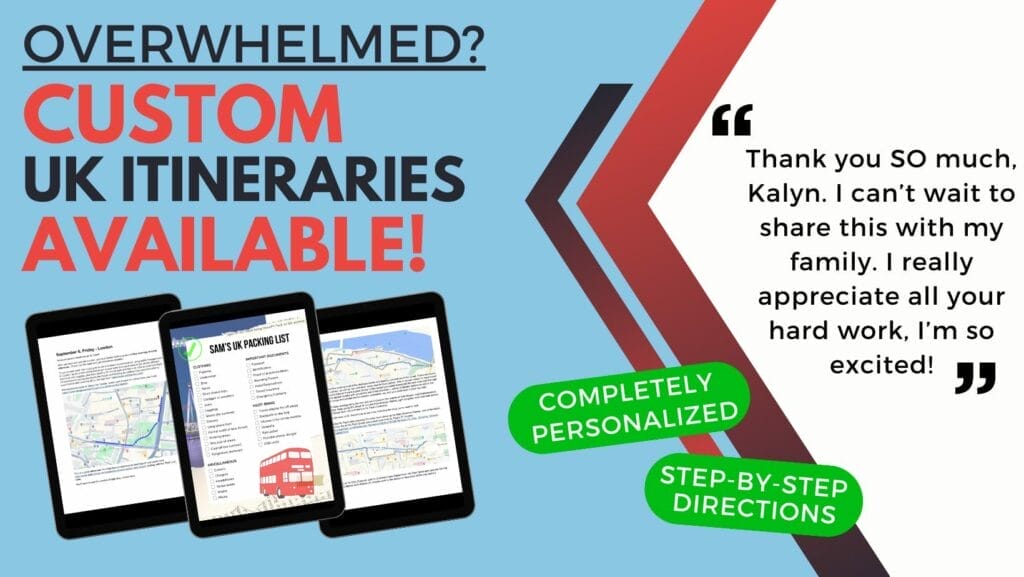
Going Through Immigration and Customs in the UK: The Process
Do you go through customs before or after your flight.
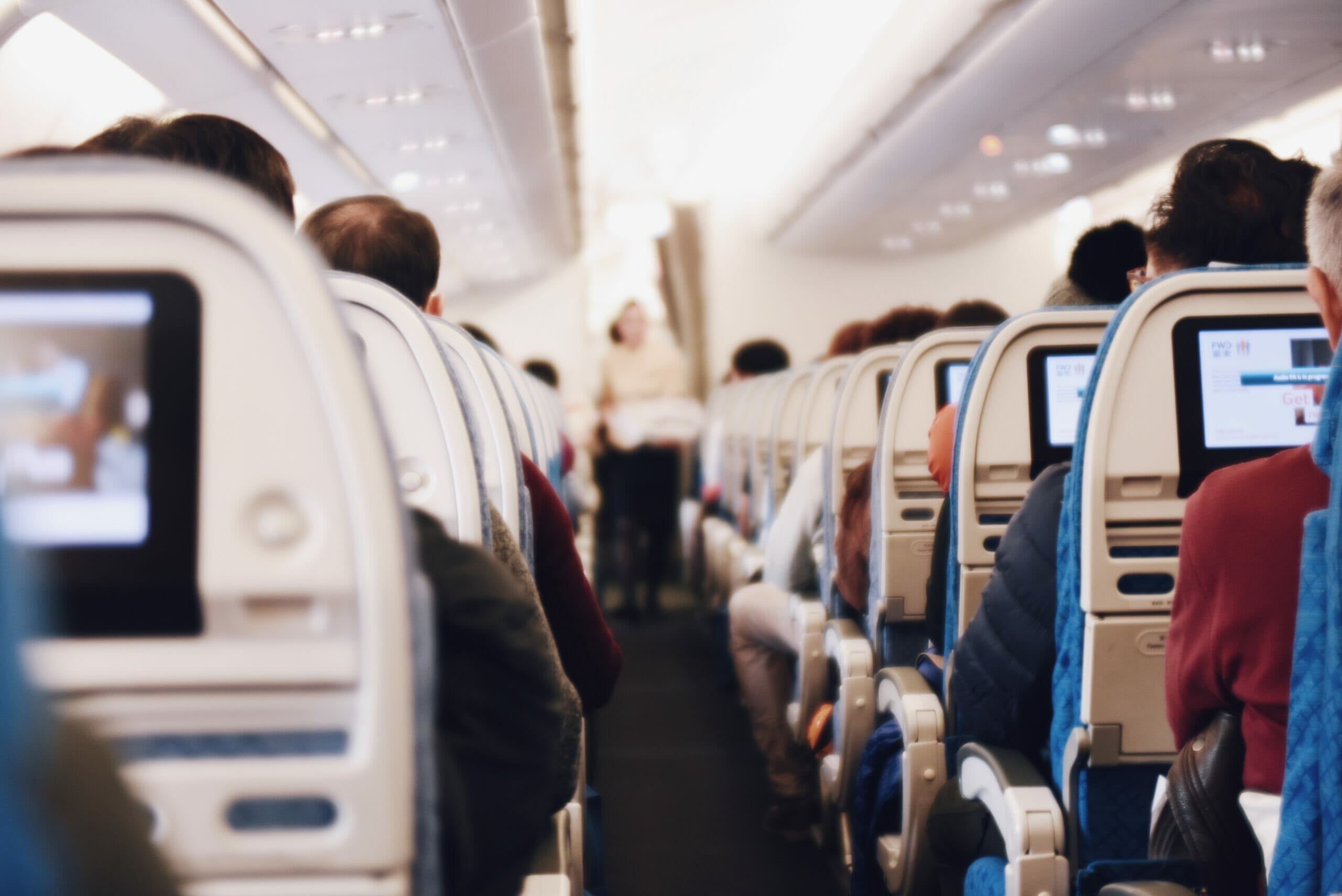
You go through customs after your flight, once it lands in the UK, but that doesn’t mean you don’t need to prepare earlier.
When going through customs at an airport, you need to figure out what steps you need to take while still on the plane.
And to be honest, we need to get clear on one thing: customs and immigration are actually two different things.
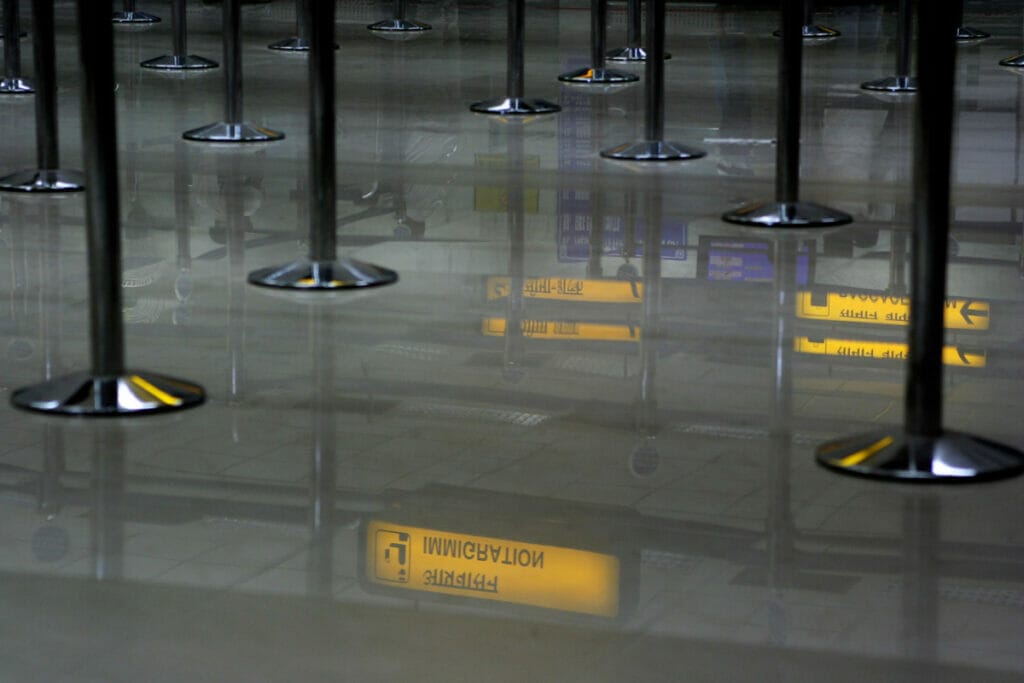
When you go through immigration, you’re going through the immigration desks where they check your passport and reason for being in the country (or you’re going through the e-Gates, as we’ll talk about in a minute).
When you go through customs, the officials are more concerned about what you have in your suitcase, as you’ve already got through the immigration desks.
It used to be that you needed to fill out a landing card to get into the UK if you weren’t from the UK or EU, but those days are over in favor of a new “e-Gates” system where many people will just need to walk through some gates after scanning your passport.
I’ll talk about that below, but know that you do not need to fill out anything on the plane anymore when coming to the UK.
What you should still know, while on the plane, is what kind of immigration line you should get in when you get there (e-Gates or regular), and also make sure to have written down the address you’re staying at.
If you do need to go through the regular immigration line, this can often be asked and is a bit of a red flag for them when someone can’t produce information on where they are staying.
IMPORTANT: are you coming to the UK from abroad?
In case you’re reading this from outside the UK and will be a foreign visitor here, you need to know these 2 things to stay safe and save money.
- Travel insurance – you need it when going overseas! I use this site to get the best quotes and purchase my packages from. Do not skip this – having medical coverage abroad as well as other coverage in case of missed flights, lost luggage, etc is essential. As I said, I have never gone wrong using this site .
- International debit cards without fees – do not get stuck paying extortionate foreign fees when using your card abroad (and the UK is almost all card these days). I use the Wise debit and travel card which you can apply and learn more about here .
Going Through Immigration Once You Land: When Do You Go Through Customs?
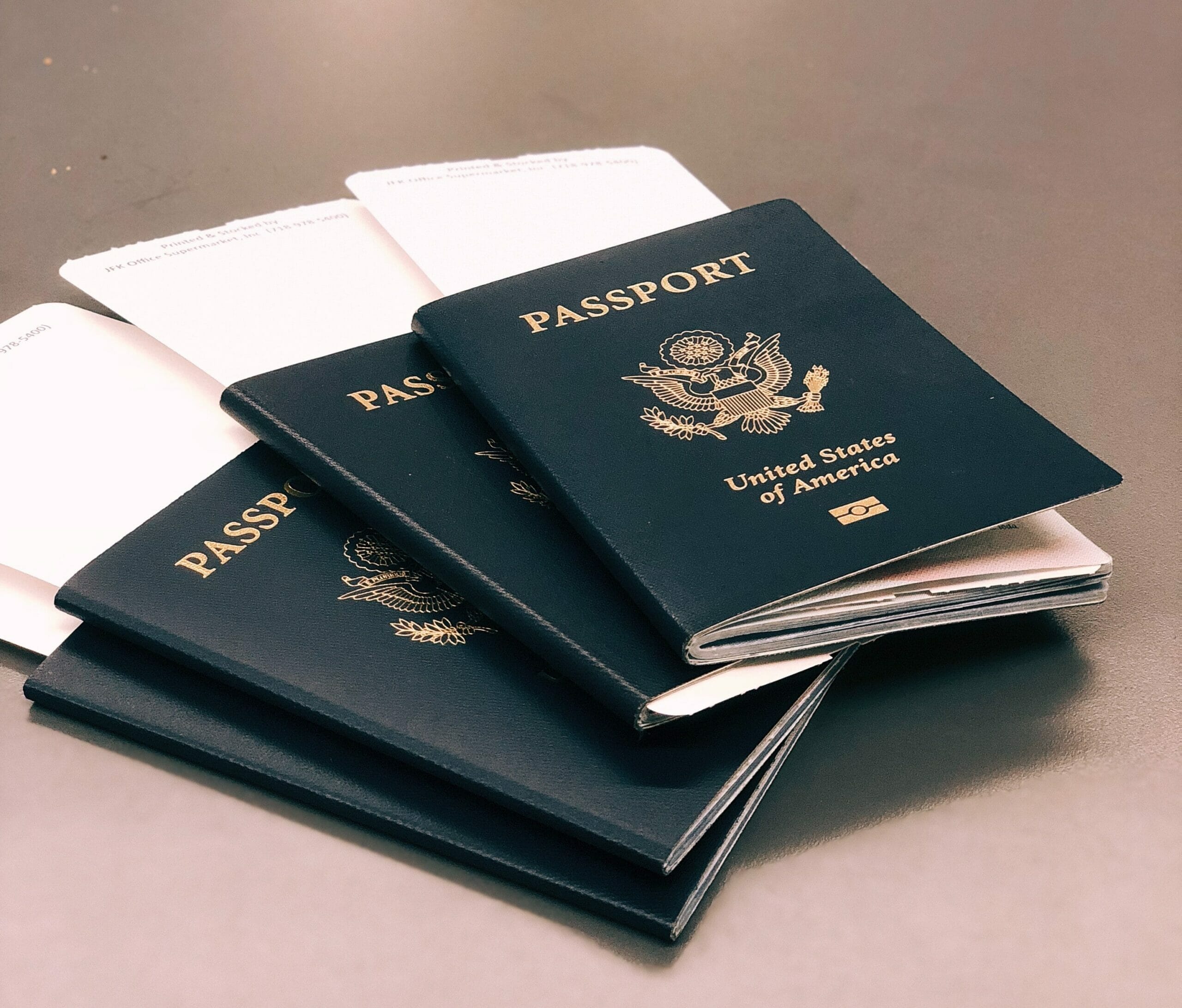
When you land in the UK, you’ll be herded into the immigration hall before collecting your checked luggage.
At this point in going through UK immigration at an airport, you’re going to need to put your cellphone away and keep your wits about you.
There will be a ton of people everywhere and staff members showing you where to go.
They don’t play around, so just be nice and be efficient with where you’re going – don’t block everyone as they’re trying to figure out which line to go in.
There are two routes to go through – one is the E-Gates which are automatic gates that allow you to scan your passport.
It then takes your photo, and then the gate will open and you will walk through.
The other option is the regular immigration line to speak to a person if you do not qualify for the E-Gates or have a reason to speak to a border entry official.
You can go through the e-Gates if you are from: the UK, the EU, Australia, New Zealand, United States, Canada, Japan, Singapore, or South Korea, and you need to be above 12 years old and in possession of a passport with a “chip” in it (which is most of them).
If you are between 12 and 17, you can go through the e-Gates if you are accompanied by an adult.
If you do not fit in this description – maybe your passport isn’t from those countries or you have a child under 12, you need to go through the regular immigration line that ends up at an actual human!
If you are a student in the UK, make sure to check with your university how you should go through immigration as sometimes they will need you to go to an immigration official and not through the e-Gates, but this depends on how long you are staying and where you are studying – so ask!
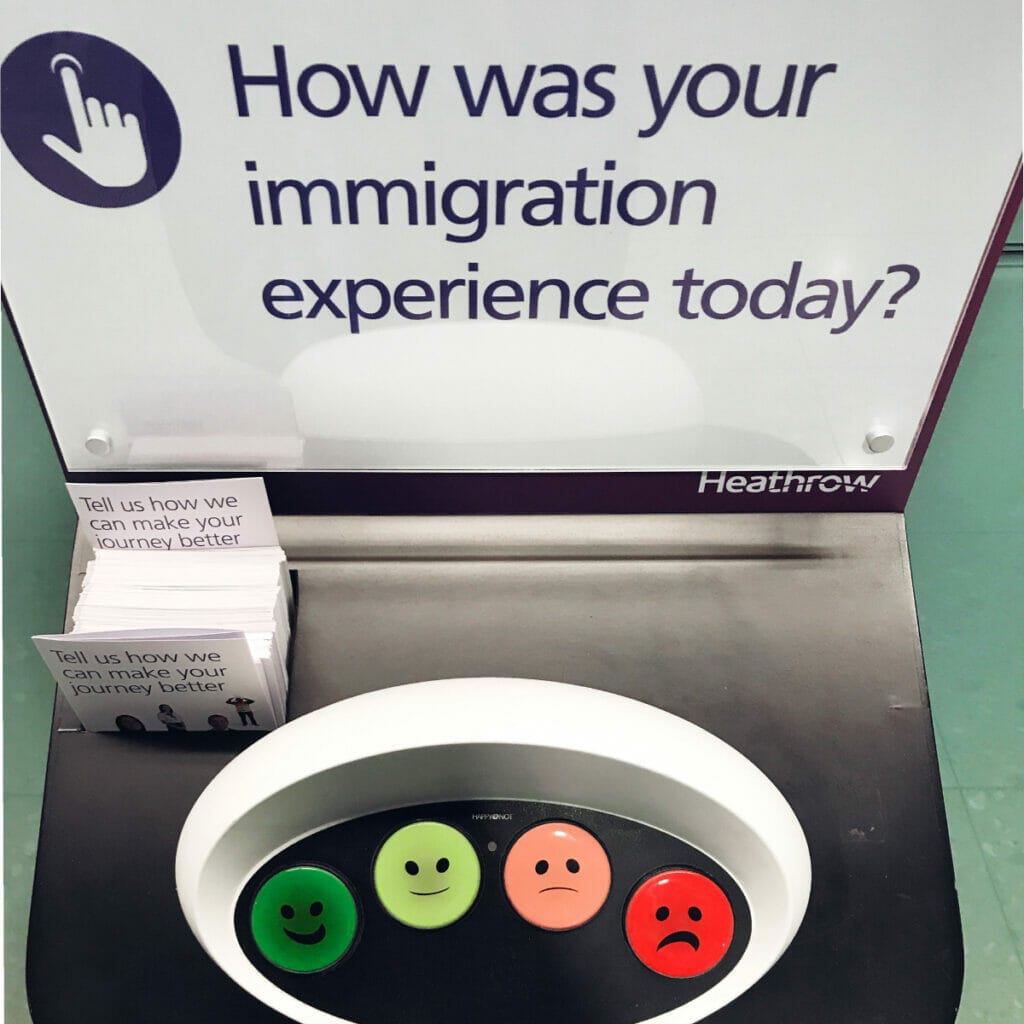
Families should stay together, so if your partner or someone in your family can’t go through the E-Gates, it’s usually best to go through the regular immigration line with them to avoid them having to explain your existence and talk about traveling with you while you aren’t actually there.
This is also, of course, a blatant test of how much your traveling companion likes you–will they stand in the long line with you, or will they zip through and wait for you on the other side?
Dealbreaker.
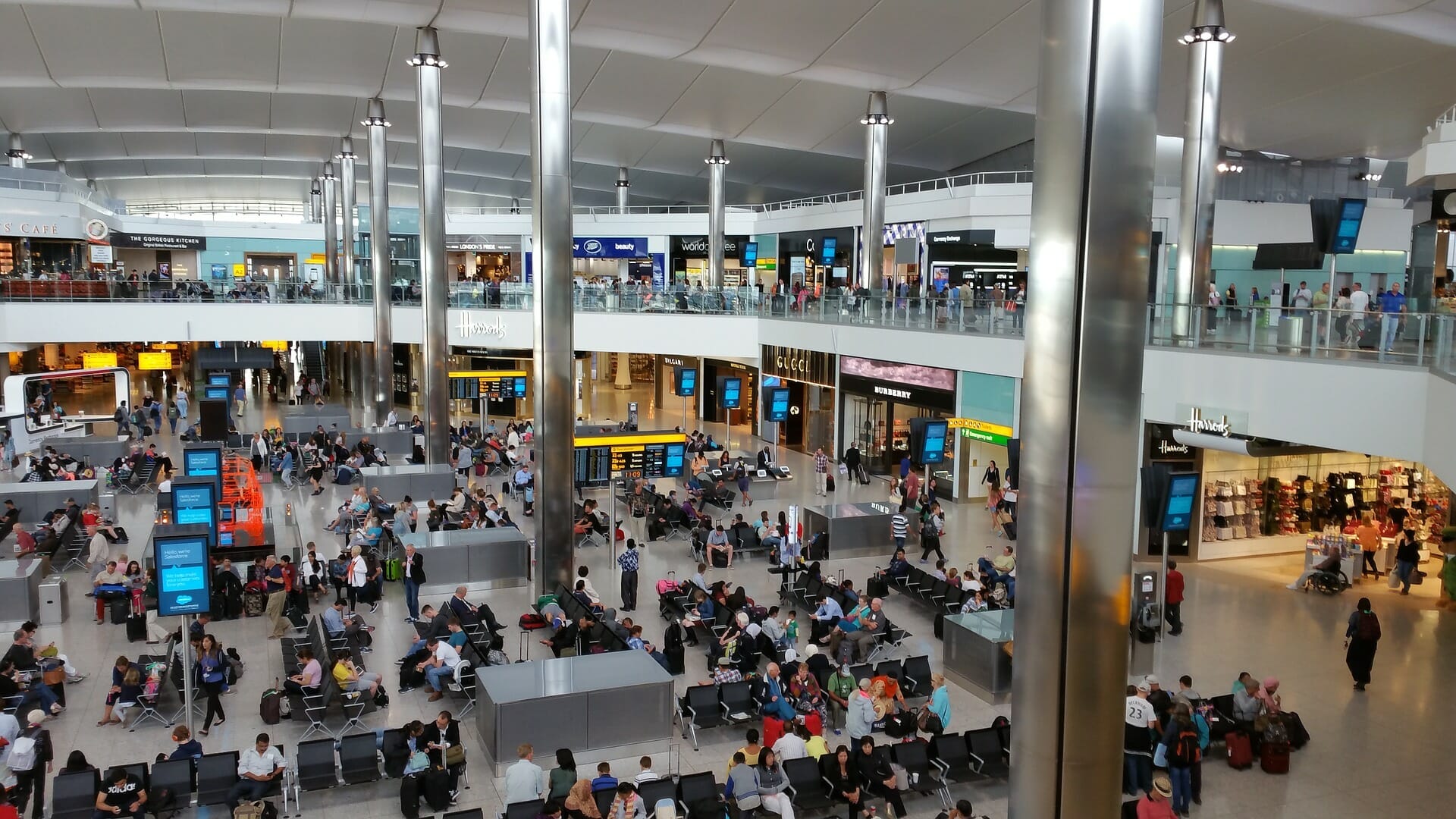
How to Go Through Immigration: Speaking with a UK Immigration Officer
If you do need to go through the regular immigration line, the next step is a conversation with the border control officer.
You’ll wait to be called up – don’t just go to the next open desk unless someone motions you to move forward.
This is the part that makes many travelers nervous, but there really is no reason to be given that you have a legitimate trip planned.
If you’re coming in with a visa, they’ll ask you questions particular to your visa type (where you’re working if you’re on an internship visa, where you’re studying if you’re on a student visa, etc).
If you’re coming in as a tourist or visitor, they’ll want to know who you are seeing (if anyone), they may ask you general questions on your itinerary and they may ask what you do back home.
They’re not looking to see if you know what you’re doing on Wednesday night at 8pm or quiz you on UK geography to make sure you’re worthy of exploring the country, so just answer their questions honestly.
If you’ve planned a real trip, you’ll at least have some sort of idea of what you’ll be up to and where you’re going – or what your option will be.
Breathe, be polite, and don’t be put off if they’re particularly gruff.
If you have one, it’s always good to have a copy of your return flight with you in case they ask to see it or have any doubts about your intentions.
I’ve had a combination of experiences with UK immigration officers, which makes going through UK immigration a bit of a stressful experience as I’m not sure who I’m going to get.
The worst was a woman who wasn’t calculating the months correctly and kept telling me I was planning on overstaying my visa based on my proposed leaving date (I wasn’t).
The best was the woman who gave us the tips on when best to fly in to avoid the lines and the man who made a joke about my boyfriend wanting to be my husband when we were traveling together in the first few months of our relationship – turns out he was right!
What Happens if I Get Detained at Immigration in the UK?
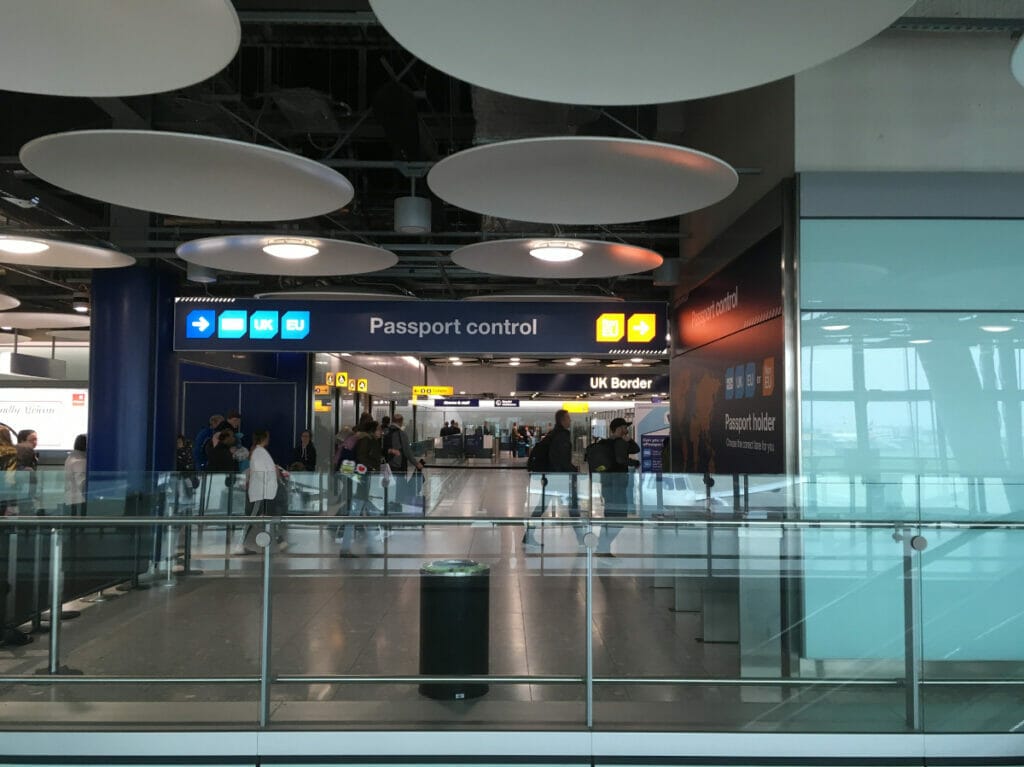
Would you believe that I’ve gotten detained at a UK airport before?
Okay, so not detained as in, arrested, but detained as in, made to sit in the weird holding cell where they put you if they need more time to investigate your visa or your travel situation.
This can be a very stressful time.
For me, it was because for some reason my visa information wasn’t electronically attached to my actual visa, which had nothing to do with me and was solved after the immigration officer physically checked the visa to see it was valid.
For other people, this can be because they need to question you further, and unfortunately if they do think you have the wrong intentions or you’re trying to come in on the wrong visa, you will be escorted onto the next available plane back to where you came from and not allowed entry into the country.
If you do find yourself being questioned, I’m going to assume that you have done nothing wrong and are being honest about your intentions, in which case just keep a cool and calm demeanor as much as possible, answer their questions honestly, and soon you should be sent on your way.
Going Through Customs at an Airport
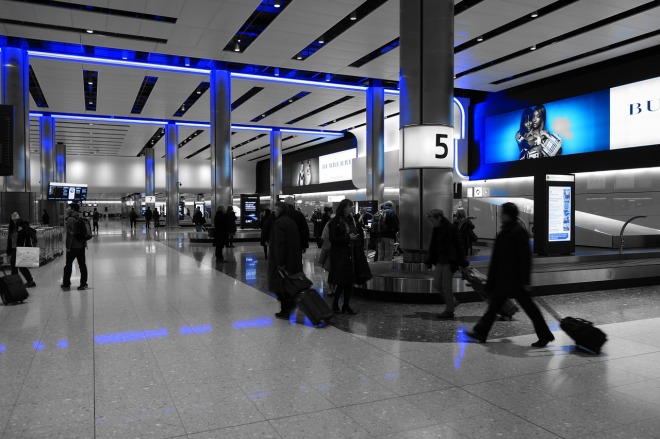
After going through border control successfully, you’ll reach the luggage holding area.
Hopefully you’ll pick up your own and not accidentally cart away someone else’s unmentionables, and then the final step is customs.
In America, getting through customs tends to include an actual stop with an officer who will double check that everything in the luggage is yours and may search you if they feel you might be bringing something you shouldn’t into the country.
You’ll need to fill out a customs form in the US to declare anything that you have that needs to be declared.
They are strict about this, and while sometimes you may just be waved through, they have the right to pull you aside and check.
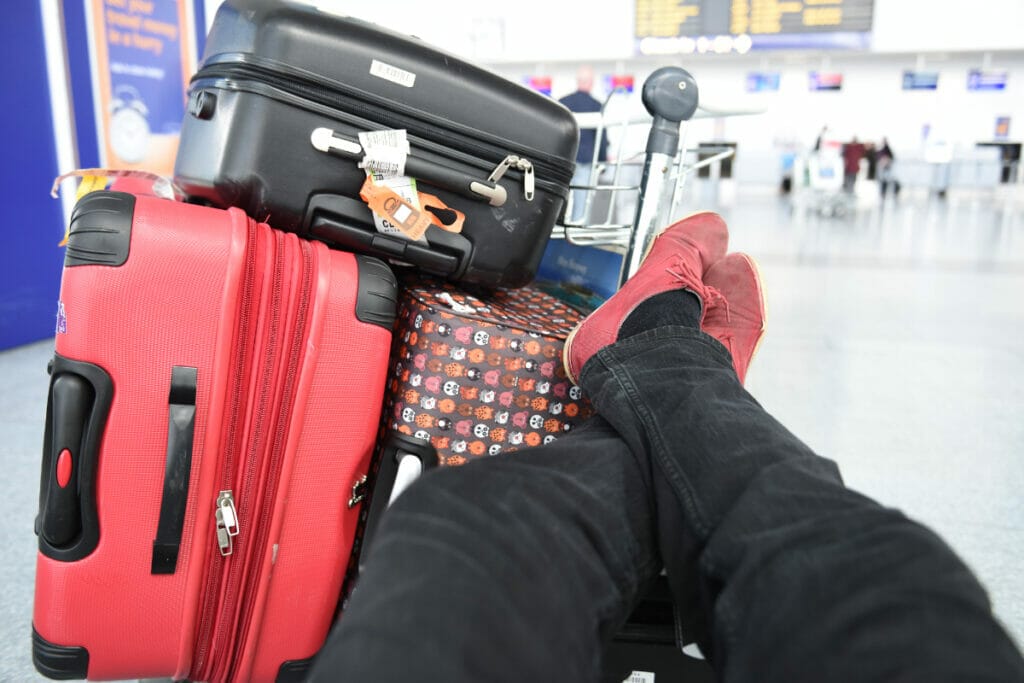
Going through customs in the UK is different, as you simply walk through either the “Something to declare” doors or the “Nothing to declare” doors.
You do not individually have to go up to a person to be cleared to leave the area, though again, they do have the right to search your bag as you leave.
Here’s a list of things you must declare.
Don’t let it confuse you, though.
If you aren’t coming into the UK to sell anything and are just coming as a normal tourist, you will have nothing to declare. The vast majority of people will not have anything to declare.
My mom was confused by customs when she first visited and decided she should probably declare the Outback restaurant bread she had brought for me from the American airport.
I like to think they all went home that day to tell their family about the crazy lady who presented them with a loaf of bread to search.
And…that’s it!
Customs and Immigration is known for being one of the longest and most tedious processes at the airport for foreign travelers, but if you do your best to have everything ready and know what to expect, you’ll be able to get through it much faster.
The e-Gates in the UK have also gone a long way towards making this easier.
To help you along the way, I’ve got some of my top tips for getting through customs and immigration that apply to anyone, no matter which airport you’re flying into.
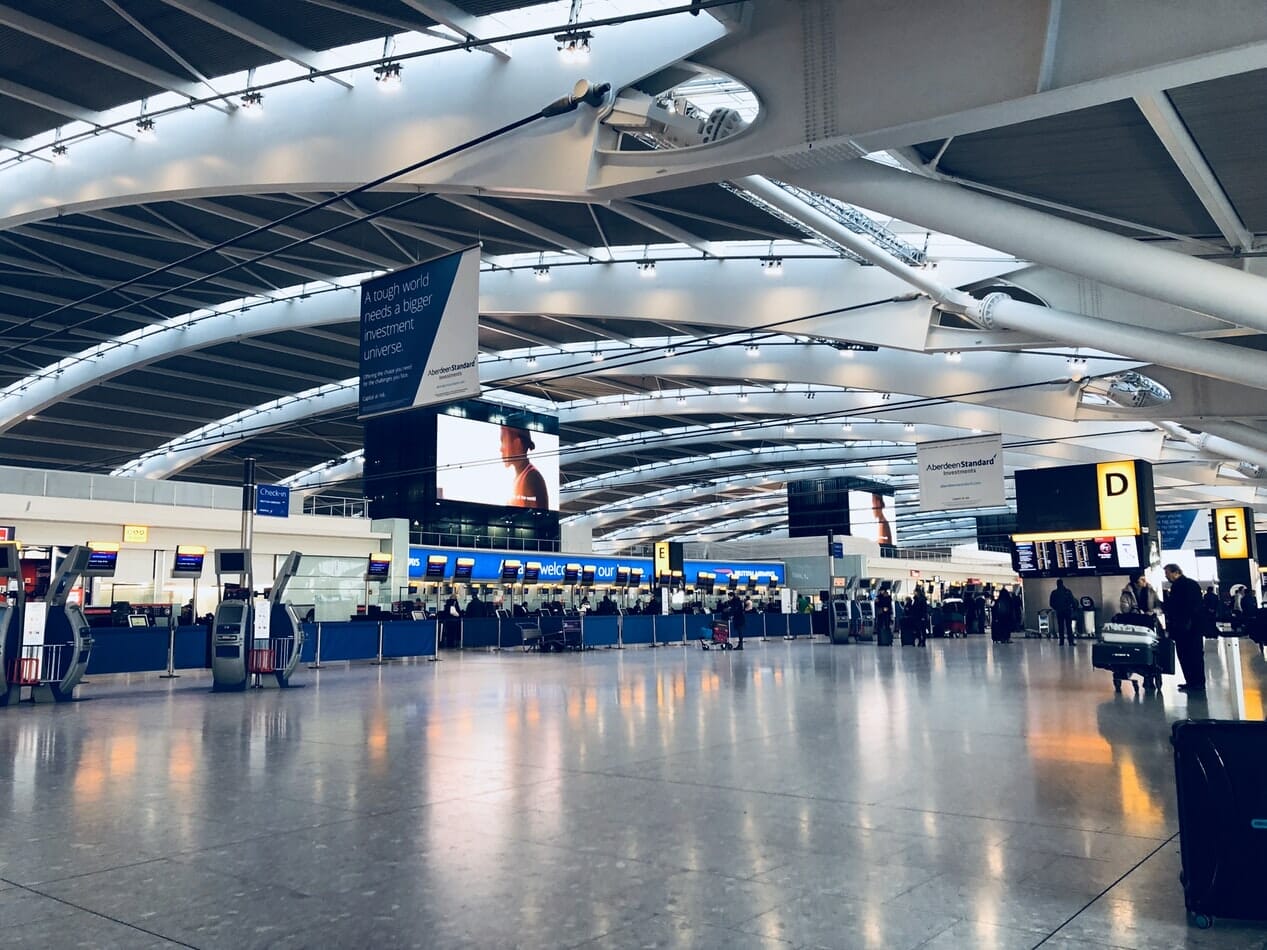
Tips for Going through Customs and Immigration
1. leave time in your itinerary for going through immigration.
Depending on the time of day, sometimes immigration takes a long time.
Again, this has sped up due to the e-Gates and the e-Gates usually take about 10 minutes to get through, but if you have to stand in line, it can be a bit of a wait.
Especially if you fly into London Heathrow on a weekend morning during prime study abroad seasons, you’re going to encounter a long line full of weary travelers.
When it comes to planning the rest of your day after landing in a country or even planning a layover if you need to go through immigration before getting on another plane (such as when you’re arriving in the US from abroad and then need to clear immigration before getting on a domestic flight), make sure that you leave time.
2. Have as Much as Possible Written Down
Whether it’s the address of where you’re staying or the prescriptions to go along with your medication, having things written down on paper and not just stored on your phone is super helpful.
Sure, there are charging ports on most planes, but if you’ve got everything stored on your phone and for some reason the charging port isn’t working or you’ve dropped it in the toilet or something, you’ll be prepared still!
3. Be Nice to the Staff
It can be difficult to be nice after traveling for hours to a person who isn’t being the kindest to you and seemingly grilling you with questions.
However, keep in mind that they are just doing their jobs.
They need to be on the ball, figuring out if you are breaking any immigration laws coming into the country or if you are there to do anything shady.
I’ve learned time and time again that getting through immigration is so much easier when I just relax, am polite to the staff even if they’re bit a bit gruff with me, and eventually I get through with a smile on my face – or at least not in complete hysterics.
4. Prep Kids on What’s Going to Happen
Just like when you go to the airport and they check your passports to get on the plane, the staff members will need to see and usually speak to your kids at the immigration desks if they are under the age of 12.
They will be with you, of course, but it’s helpful to prep them in advance that they may be asked questions like their age and name especially if you have particularly shy ones.
5. Consider Customs and Immigration Part of Your Plane Ride
Often when we land in a new country, we are so relieved the plane ride is over that we view the immigration and customs sections as just another hurdle to jump through that’s holding us up.
You can’t enter another country without doing this step, so consider it just an extension of the plane ride.
Landing is exciting, but save your real excitement for when you’re past those immigration gates and frolicking off into the UK for the adventure of a lifetime.
Happy traveling!

How long does it take to clear customs at Heathrow?
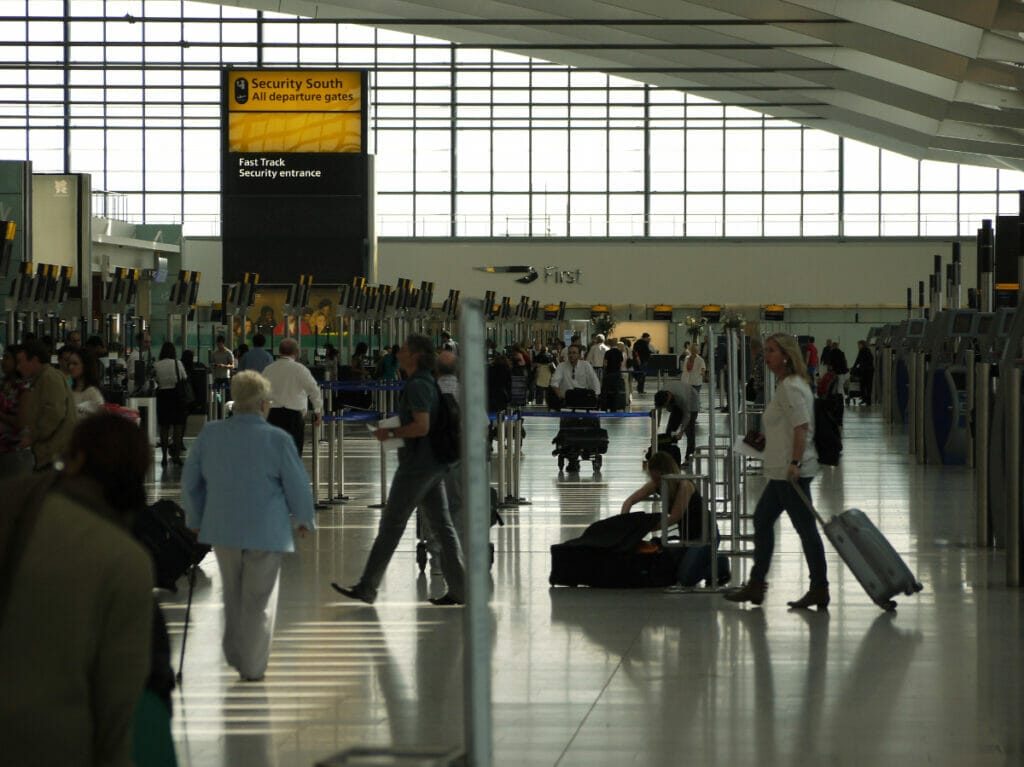
On average, it takes between 30 minutes and 1 hour to clear customs and immigration at Heathrow Airport.
This, however, does not take into account the time it takes to get off the plane and walk to the customs and immigration hall, so I typically tell people to expect to be completely ready to be picked up/carry on with your onward journey about 1.5 hours after your plane lands.
You should increase the amount of time you leave yourself during holiday travel season and if you are arriving during popular times for international flights (typically the morning rush are the flights coming from North America).
How long does it take to clear customs at Gatwick?
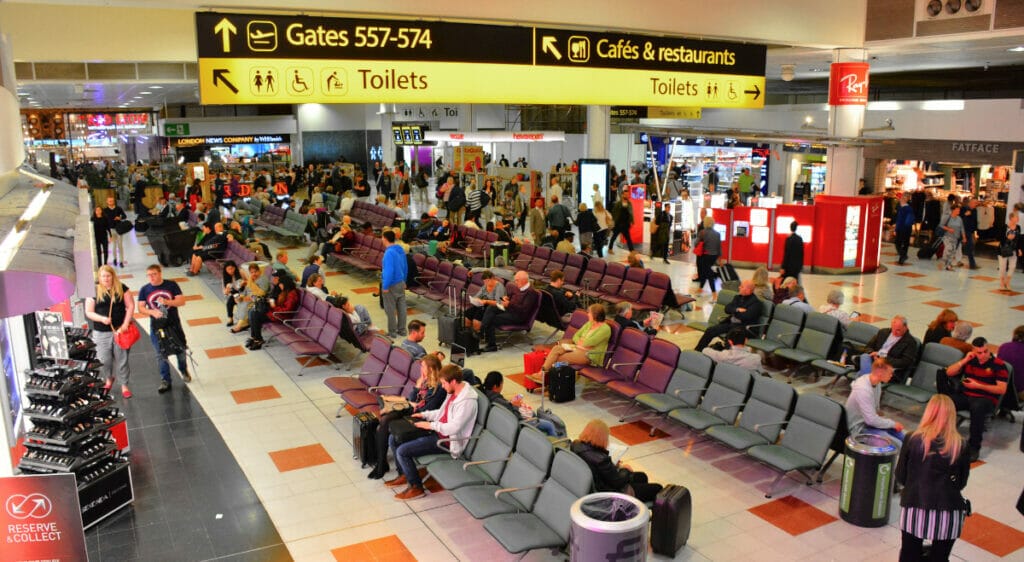
On average, it takes between 30 minutes and 1 hour to clear customs and immigration at Gatwick Airport, and that’s including the time it takes you to wait for your luggage.
This is because the eGates have made everything much faster, and once you grab your luggage, you simply walk into the arrivals hall under the “nothing to declare” door for most people without needing to speak to a customs officer.
I usually give myself an hour at Gatwick because it’s larger than Heathrow which just means more walking.
Heading to London? Want the best tips?
Check out my Ultimate Guide to London for Visitors. Using text, images and video, this guide is packed full of tips, tricks, safety advice, knowledge on how to get around and what to do, and more!
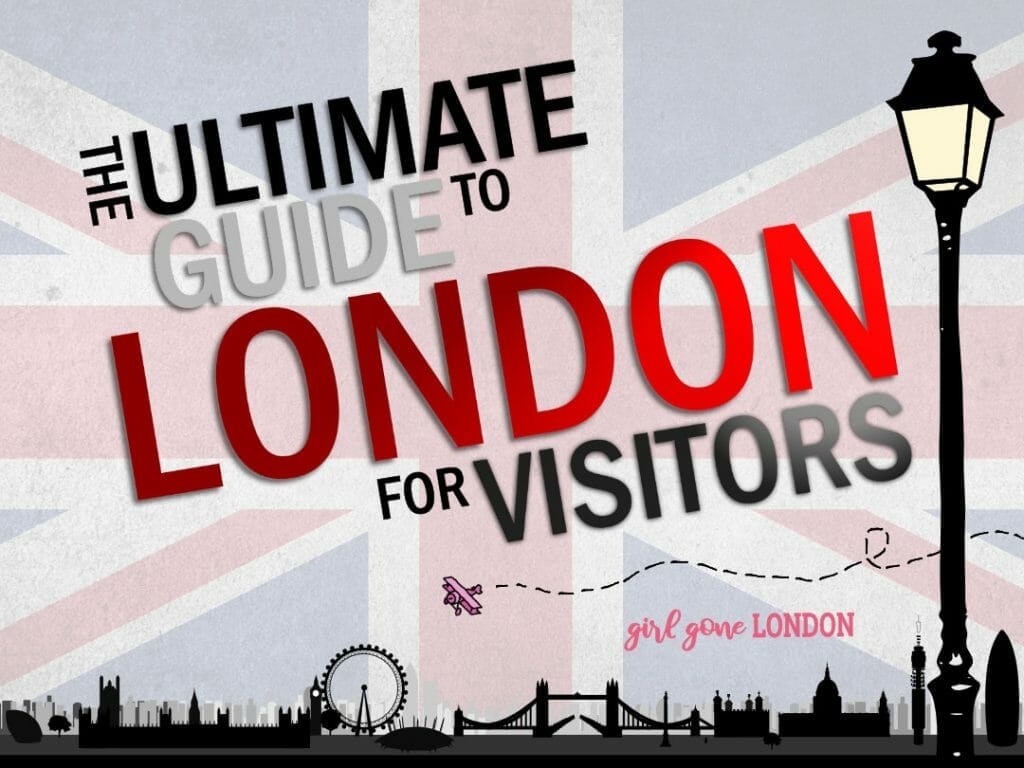
Moving to the UK or already an Expat?
Grab my book which covers moving to the UK, struggles I faced and that you might face too, and uplifting advice to help you along the way! Available in hard copy and on Kindle.
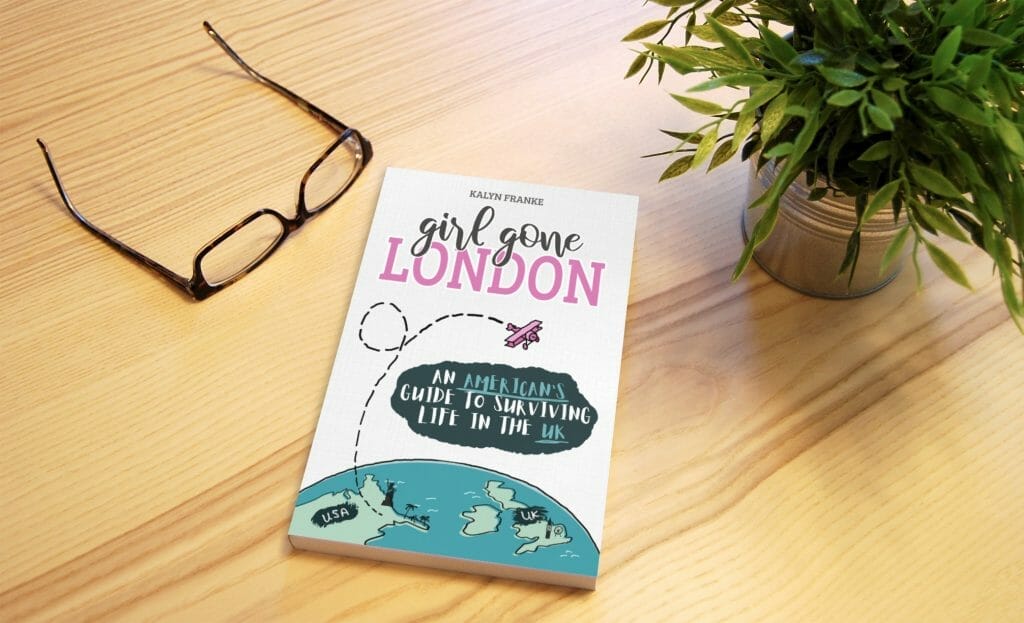
14 thoughts on “Exactly How to Go through UK Customs & Immigration + how long it takes”
Going through immigration can be really stressful. Before being a citizen, my husband – who is British – would queue with me every time we travelled together (that is love hahaha). Great post!
True love, most definitely! I feel like the ultimate relationship test should be whether your Brit will wait in line with you. If not, they’re not worth it!
Love is…entering your own country as a foreigner hahaha
UKBA do a great job and all, but damn it is not a comfortable experience having to convince them you are only coming for a holiday and not to work unlawfully and steal all their jobs. I live in Viet Nam now and my average time from the taxi dropping me off to my international departure gate is 20 mins. It is bliss, but I do wonder how much stuff gets through without being checked.
Thanks for this info! I’ve been a bit apprehensive about going through this process in my upcoming trip to London from the US. Your tips answered a lot of my questions.
I will be traveling to London and other cities in Europe with my cousins after the COVID-19 pandemic is over. I have been to London 3 times and have had no problem with going through customs.
This time will be different because my cousins have dual citizenship in the US and in an EU country. They are going to be using their EU passports when we travel. I only have a US passport. Will this cause problems for us in customs? I assume people with US passports and people with EU passports go in separate customs lines, correct? In your tips you say families have to travel together. Does this include people with different last names? They have the same last name and I have a different last name? But we are family. I have a biometric passport, so would I need to speak to an customs officer if I have nothing to declare?
Do all customs lines at Heathrow or Gatwick airport come out at the same baggage hall?
Thank you for your help. I want to make going through customs as easy as possible.
Hi Sam! Hope you have a great trip when it’s time for it.
EU passports and USA passports now go through the same line – the e-Gates. You won’t need to speak to an immigration officer and can go with your cousins.
If, for some reason, your passport doesn’t work at the eGates, they would then direct you to speak to an Immigration Officer but you would just tell them you are traveling with your cousins who have already gone through the E-gates, and it all comes out to the same baggage hall since you would be in the same terminal going through the immigration process, even if you get temporarily separated.
Hope that helps!
My daughter will be studying abroad at Lancaster University next semester, and I need to make flight reservation for her from the US to Manchester. The flight I am looking at has an hour and a half layover at Heathrow. Is that long enough for her to go through immigration and customs and make her flight to Manchester? She has never travelled internationally alone, so she’s going to be a little lost.
Great blog! Using it to prepare for when my daughter and I visit the “old country” next spring. Question: How do we get our visitor’s visa if we go through the e-Gate? We have valid US passports. Thank you for your ehlpful advice.
Hi Julie! If you’re just a regular visitor from the US, you won’t need to apply for any visitor visa ahead of time. There’s no certification or anything. Just walk through the e-Gates and then you are in and have 6 months allowed in the UK as a visitor. 🙂
Flying Pittsburgh (U.S.) to Barcelona, with connection in London. Bags checked through. Going on a cruise (don’t know if that matters). What, if anything, do we do during this connection to our next flight? I’m thinking immigration (passport control) in London, but not customs until Barcelona. Is that accurate?
Great post and so informative! I am curious about Heathrow’s reputation of being VERY strict on hand-luggage liquids? I’m traveling from the United States, where TSA is almost always relaxed about carry on liquids as long as it’s under 3.4 oz but I do understand why Heathrow is very specific about only having 1 quart sized bag for all liquids in a carry on. If I am only bringing a carry on from the US but will be arriving at Heathrow, do I still need to follow the 1 quart bag of liquids rule through customs and immigration? I am not flying out of Heathrow when I head back to the states for reference. Thanks for your help!!
Hi, Very informative. If going from Dublin to London to get connecting flight back to US. May I put the Irish whiskey I’m buying in Dublin in my checked bag and not have to go through the checking process again in London? . Taking AirLingus from Dublin to Heathrow which is domestic flt. Then United to Los Angeles from Heathrow Thank you
Who do you recommend for transfers into the city. I will be arriving from the U.S.A. so I believe it would be terminal 2.
We will be on holiday for 3 weeks so we will have 3 large luggage and 3 carry on pieces.
Leave a Comment Cancel Reply
Your email address will not be published. Required fields are marked *
This site uses Akismet to reduce spam. Learn how your comment data is processed .
- Northern Ireland
- Southern England
- Northern England
- Other Regions
- Shopping Guides
- Restaurant Guides
- Historic Attractions
- Theme Parks/Adventure
- World Heritage Sites
- Top UK Attractions
- UK National Parks
- England Airports
- Scotland Airports
- Wales Airports
- Northern Ireland Airports
- UK Airport Hotels
- North America
- Travellers Tips
- UK Travel Tips & Advice
- Articles & Inspirations
- Holiday Packages
- Hotel Reservations
- Travel Tools
- UK Holidays
- Travel Articles
- UK Travel Tips
- Tips for Travellers
- Tourist Information
- Tourist Info Centres
- Travel Offers
Visiting the UK Entry Requirements
Related articles, uk travellers faq, middle east.
- Website Terms
- Site Disclaimer
- Privacy Policy
COVID 19 UPDATE:
Our staff has been mildly affected by the coronavirus (COVID-19) outbreak in our office premise, we want to act fast and ensure we’re taking all the precautionary measures to avoid any risks. Please expect delays in email and telephonic correspondence.

- 1-800-691-2335
UK Customs Regulations for Shipping from USA: A Simple Guide
Learn the basics of UK customs regulations when importing from the USA in this simple guide. Understand duty, taxes, allowances, and prohibited items.
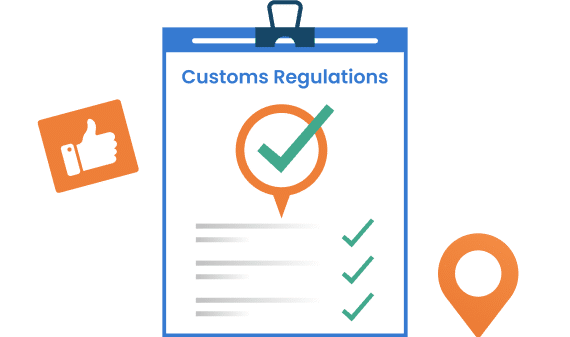
Get Quote and Save UPTO 70% on your next shipping
Navigating customs regulations can be a daunting task, especially when importing goods into a new country like the United Kingdom from the USA. Understanding the rules and procedures can help streamline the process and avoid unnecessary delays or fines.
In this article, we’ll break down the customs regulations of the United Kingdom in simple terms, focusing on key aspects such as duty, taxes, allowances, and prohibited items.
Understanding Customs Duty and Taxes
In the United Kingdom, customs duty is imposed on imported goods valued at more than £135 (~$170). This duty is assessed based on the fair market value of the goods upon their arrival in the UK.
It’s important to note that import prices typically include various costs such as insurance, freight, and duty. Additionally, a standard 20% Value Added Tax (VAT) is levied at the border on the total value of the goods. However, certain goods may qualify for reduced rates, such as 5%, or may even be zero-rated at 0%.
Import Goods into the UK: Step-by-Step
Importing goods into the United Kingdom from the USA involves several steps to ensure compliance with customs regulations. Let’s break down the process into simple steps:
Step 1: Check if you need to follow this process
Before importing goods into the UK, determine whether you need to adhere to the customs declaration process. This step ensures that you understand the requirements and obligations associated with importing goods.
Step 2: Get your business ready to import
Ensure that your business is prepared for the importing process. Verify if the business sending you the goods is authorized to export to the UK. This step ensures that all necessary arrangements are in place to facilitate smooth importation.
Step 3: Decide who will make customs declarations and transport the goods
Determine who will be responsible for making customs declarations and transporting the goods into the UK. This may involve hiring a customs broker or freight forwarder to handle the logistics and paperwork on your behalf.
Step 4: Find out the commodity code for your goods
Identify the commodity code for the goods you intend to import. The commodity code categorizes goods for customs purposes and determines the applicable duty rates. Additionally, calculate the value of your goods, including factors such as cost, insurance, and freight.
Step 5: Find out if you can reduce your Customs Duty
Explore options to reduce Customs Duty, such as utilizing preferential trade agreements or claiming duty relief schemes. Additionally, inquire about the possibility of deferring Customs Duty payments to ease financial burdens.
Step 6: Check if you need a license or certificate for your goods
Determine whether your imported goods require any licenses or certificates for compliance with UK regulations. Certain products may have specific licensing requirements to ensure safety, quality, or environmental standards.
Step 7: Check the labeling, marking, and marketing rules
Ensure that your goods comply with labeling, marking, and marketing regulations in the UK. This includes providing accurate product information, adhering to packaging requirements, and meeting labeling standards.
Step 8: Get your goods through customs
Initiate the process of getting your goods through customs by submitting the necessary documentation and declarations. This involves presenting the required paperwork, paying applicable duties and taxes, and complying with customs procedures.
Step 9: Claim a VAT refund
If eligible, claim a Value Added Tax (VAT) refund on imported goods. Certain conditions apply for VAT refunds, and it’s essential to follow the proper procedures to claim reimbursement.
Step 10: If you paid the wrong amount of duty or rejected the goods
Address any issues related to overpayment of duty or rejection of goods promptly. Take necessary steps to rectify discrepancies in duty payments or resolve issues with rejected goods in accordance with customs regulations.
Step 11: Keep invoices and records
Maintain thorough records of invoices, receipts, and other relevant documentation related to the importation of goods. Proper record-keeping facilitates compliance with customs requirements and ensures transparency in import transactions.
Get Quote and Save UPTO 70% on Your Next UK Shipping
Temporary import and left luggage.
Travelers who import goods into the UK temporarily, with a maximum duration of 24 months, must provide an inventory list along with their expected date of departure from the UK.
Similarly, individuals returning left luggage are required to furnish proof of ownership or a statement confirming that the goods are being returned to the UK.
Allowances for Travelers
Most travelers are entitled to bring goods into the UK up to a certain value without having to pay duty or tax. Currently, the allowance stands at £390 for items such as perfume and electrical goods. However, passengers traveling by private plane or boat for recreational purposes have a reduced allowance of £270 worth of goods.
Prohibited and Restricted Items
It’s crucial to be aware of the goods that are banned or restricted in the UK to avoid any legal repercussions.
Some goods are banned and restricted in the UK, including:
- Controlled drugs
- Offensive weapons, for example flick knives
- Self-defence sprays, for example pepper spray and CS gas
- Endangered animal and plant species
- Rough diamonds
- Indecent and obscene materials, such as books, magazines, films and DVDs
Final Words
Navigating customs regulations when importing goods into the United Kingdom from the USA requires a clear understanding of the rules and procedures.
By familiarizing yourself with customs duty, taxes, allowances, and prohibited items, you can ensure a smooth and hassle-free importing process. Remember to always adhere to the regulations to avoid any potential fines or legal issues.
Are there any restrictions on importing food products into the UK from the USA?
Yes, certain food products may be subject to restrictions or require specific permits or certificates to ensure they meet UK food safety standards.
Can I import prescription medications from the USA into the UK for personal use?
Yes, you can import prescription medications for personal use, but you must comply with UK regulations, including limits on quantities and providing a prescription from a registered healthcare professional.
Are there any specific rules for importing electronics from the USA into the UK?
Yes, electronics must meet UK safety standards and may require specific labeling or certification to ensure compliance.
Do I need to pay customs duty on gifts sent from the USA to the UK?
Yes, gifts sent from the USA to the UK are subject to customs duty if they exceed the duty-free allowance.
Can I import alcohol and tobacco products from the USA into the UK for personal use?
Yes, you can import alcohol and tobacco products for personal use, but you must adhere to UK limits and pay any applicable duty and taxes.
Are there any restrictions on importing cultural or historical artifacts from the USA into the UK?
Yes, cultural or historical artifacts may be subject to import restrictions or require specific permits to ensure they are not illegally exported from their country of origin.
Do I need to declare cash or monetary instruments when entering the UK from the USA?
Yes, you must declare cash or monetary instruments for higher amount when entering or leaving the UK. Failure to do so can result in penalties or seizure of the funds.
See our Trusted Reviews
Your trusted logistics partner for hassle-free door-to-door shipping and moving services.
- Book Shipment
- Small Business Shipping
- Shop US and Ship worldwide
- Major Carriers
- Worldwide Destinations
- Site Search
Call Back Request
Contact Name
Contact Number
Email Address
Best Time to Call
One or more fields have an error. Please check and try again.
Form submitted
Thank you for submitting your request. Our office will contact you within 1 business day.
Chat with us!
Please enter below info to start
Please fill out the required fields to start your chat
INCOTERMS® 2020 – DOWNLOAD OUR EASY GUIDE Read more
Regulations, Requirements, Tariffs, Taxes: Everything You Need to Know About Importing Goods Into the UK

Are you a UK-based business looking to import goods into the country? If so, you’ll know that navigating the intricacies of customs clearance and import regulations can be a daunting task.
At clearBorder , we understand the challenges involved in international trade and are here to guide you every step of the way. In this comprehensive blog post, we will provide you with everything you need to know about importing goods into the UK.
A Quick Introduction
During the tax year ending April 2023, the UK imported almost £900 billion worth of goods ( Department for International Trade ) – a 17.9% increase on the previous year.
Importing goods opens up opportunities for market expansion, product variety, and quality enhancement, ultimately economic growth and job creation.
Read on as we delve into crucial topics around UK customs such as import regulations, tariff codes, import licences, certifications, and supplier relationships. We’ll explore the importance of understanding international markets and the significance of customs documentation for a smooth customs clearance process.
The Basics of Importing Goods into the UK
Importing goods to the UK involves, essentially, the movement of items from outside the UK’s borders into the country, where they are used (usually) for commercial (or sometimes personal ) purposes.
To achieve this successfully, importers must follow a series of crucial steps and considerations – and there’s a fair amount to keep across. For instance:
- Navigating customs procedures
- Complying with import regulations
- Tariff codes and import tax duties
- Obtaining necessary import licences and certifications
Key Considerations
Importing goods into the UK requires a solid understanding of the processes involved. At clearBorder, we aim to simplify this complex journey for you.
Here are the fundamental aspects you need to know:
- UK Customs: Familiarise yourself with the role of UK customs in regulating and overseeing imports. Understand the customs documentation required for smooth clearance.
- Import Regulations: Comply with import regulations governing specific product categories. Ensure your imported goods meet the necessary standards and comply with product-specific regulations.
- Commodity Codes: Determine the appropriate commodity codes for your imported products. These codes classify goods and determine the applicable customs duties.
- Import Licences and Certifications: Some products may require import licences and certifications. Identify if your goods fall into this category and acquire the necessary documentation.
- Supplier Relationships: Establish strong supplier relationships to ensure reliable and efficient imports. Clear communication and understanding of expectations are vital.
- International Markets: Conduct thorough market research to identify potential suppliers and understand international market dynamics. Consider factors such as pricing, quality, and supply chain reliability.
- Customs Documentation: Prepare accurate and complete customs documentation for each shipment. This includes invoices, packing lists, and shipping documents.
- Taxes on Imported Goods: Get familiar with applicable taxes, such as VAT or customs duties, on imported goods. Ensure proper calculation and payment of these taxes.
Import Regulations & Customs Procedures
Successfully importing goods into the UK requires a comprehensive understanding of the intricate web of import regulations and customs procedures. Let’s delve into these essential aspects in more detail.
- Import Regulations: The UK has stringent import regulations to ensure safety, quality, and compliance with specific industry standards.
These regulations vary based on product categories, such as electronics, pharmaceuticals, or textiles. For instance, electrical products must comply with relevant health and safety directives, while food imports need to adhere to stringent hygiene and labelling requirements.
Understanding these regulations is vital to avoid costly delays, rejections, or penalties. Conduct thorough research, consult industry-specific resources, and engage with regulatory bodies to ensure compliance.
- Customs Procedures: Customs procedures involve a series of steps and documentation required for the smooth flow of goods across borders. Key elements include customs declarations, classification, valuation, and clearance.
Accurate completion of customs documentation is crucial. Additionally, understanding tariff classification and assigning the correct Harmonized System (HS) codes for your products is vital for accurate customs declarations. Customs valuation methods, such as transaction value or the use of alternative valuation methods further impact import duties and taxes.
Ultimately, compliance with customs procedures ensures efficient movement of goods, minimises customs inspections and reduces the risk of delays.
For instance, let’s consider the import of textiles. Importers must adhere to textile labelling regulations outlined by the Textile Products (Labelling and Fibre Composition) Regulations 2012 . This includes providing clear and accurate labelling information regarding fibre composition, country of origin, and care instructions. Failure to comply with these regulations can result in significant delays at customs, additional inspections, and potential penalties.
Import Documentation & Requirements
Importing goods into the UK involves a range of essential import documentation and requirements. Understanding and fulfilling these obligations is crucial for smooth customs clearance and compliance with import regulations. Here are some key aspects to consider:
- Commercial Invoice: A detailed and accurate commercial invoice is essential for customs declarations. It includes information such as the buyer and seller details, description of goods, quantities, values, and payment terms.
- Packing List: A packing list provides a comprehensive breakdown of the contents and packaging details of each shipment. It helps customs officials verify the goods against the accompanying documents.
- Bill of Lading or Airway Bill: These shipping documents serve as evidence of the contract of carriage and provide details about the transportation of goods by sea or air.
- Import Licences & Certificates: Certain goods may require specific import controls , licences or certificates, such as phytosanitary certificates for plant products or import licences for controlled substances. Ensuring you possess the necessary documentation is crucial for compliance.
- Customs Declarations: Accurate and timely submission of customs declarations is essential for customs clearance. This includes providing information about the goods, their value, origin, and applicable tariff codes.
Tariffs, Duties, & Taxes On Imported Goods
Importing certain items into the UK entails the obligation to pay tariffs, duties, and taxes on those goods. These charges, levied by customs authorities, serve multiple purposes within the context of international trade.
Import taxes (including tariffs and duties) are implemented to achieve various objectives. They aim to:
- Safeguard domestic industries
- Regulate international trade
- Generate revenue
- Maintain fair competition
By imposing tariffs, the government seeks to balance economic interests and create a level playing field for both domestic and foreign businesses.
Tariffs are taxes applied to imported goods based on factors such as their value, quantity, or weight. Duties, on the other hand, are specific taxes or fees levied on particular products, such as excise duties on alcohol or tobacco.
The rates of tariffs and duties can vary based on the classification of the product, its country of origin, and any applicable trade agreements in place.
Import taxes also play a significant role in contributing to government revenue. They form a part of the overall taxation system, helping to fund public services, infrastructure development, and social programs. VAT is a common form of consumption tax applied to most goods imported into the UK.
Failure to comply can result in penalties, including fines, seizure of goods, or legal consequences. Accurate calculation, proper declaration, and timely payment of import taxes are vital to ensure compliance and avoid potential penalties.
By partnering with clearBorder, you can navigate the complexities of import taxation. Get in touch now for specialist advice regarding customs compliance for your business , or enrol your team on our Border Ready Importing and Exporting training course to upgrade your in-house skill sets.
Navigating Import Licences & Certifications
Successfully navigating the import process involves understanding and obtaining the necessary import licences and certifications. Let’s explore an ideal use case of how this might play out in the real world.
Imagine a UK-based company specialising in importing organic food products from the EU. To ensure compliance with UK regulations, they diligently pursue the appropriate import licences and certifications. In this case, they obtain the Organic Certification from an approved certification body, demonstrating that their products meet the required organic standards.
Additionally, they secure the COI ( Certificate of Inspection ) from the Department for Environment, Food, and Rural Affairs (DEFRA). This combination ensures that their organic food products can be legally imported into the UK.
By proactively obtaining the necessary import licences and certifications, this organisation not only adheres to regulatory requirements – it also gains a competitive advantage in the market. Their commitment to compliance and product quality allows them to confidently navigate the import process, ensuring cost-efficiencies, the smooth arrival of their organic food products, and an ability to meet the growing demand for sustainable and organic choices in the UK market.
Types of Import Licences & Their Applications
Importing goods into the UK often requires specific import licences to ensure compliance with regulations. Here are some common types of import licences and their applications:
- Phytosanitary Certificate: This certificate is required for importing plants, plant products, and certain agricultural commodities to prevent the spread of pests and diseases.
Example: A UK-based company importing cut flowers from the Netherlands must obtain a phytosanitary certificate to demonstrate SPS control compliance.
- Certificate of Conformity: This certificate confirms that imported goods meet specific standards, such as safety, quality, or technical requirements.
Example: An automotives retailer importing vehicles must obtain a certificate of conformity to ensure the products meet UK safety standards.
Ensure Smoother UK Imports With clearBorder
By its nature, importing goods into the UK involves navigating a complex landscape of regulations, procedures, and documentation. Understanding the key considerations, import regulations, customs procedures, documentation requirements, and import taxes is essential for a successful import operation.
At clearBorder, we specialise in providing specialist trade consultancy and training to help businesses navigate these intricacies with ease. Whether you need assistance with customs clearance, import licensing, or understanding trade regulations, our team of experts is here to support you.
Get bespoke customs compliance guidance for your business today, or contact us to discuss how our services can help your business thrive in the international trade arena.

Importing Goods Into the UK: FAQs
What are the basic steps involved in importing goods into the uk.
Whatever your specific business niche, and the nature of your products and/or services, there are a few top-level steps on the journey to importing goods. In general, aim to:
- Determine the commodity code and import duty rate
- Arrange transportation and shipping
- Complete customs declarations and provide necessary documentation
- Pay applicable import taxes and duties
- Clear customs and arrange for final delivery
What are the key considerations to keep in mind when importing goods?
As above, the specific considerations you’ll need to be aware of will depend on the nature of your operations – with that said, it’s good practice to keep the following in mind:
- Proper classification and valuation of goods
- Compliance with import regulations and licensing requirements
- Understanding customs procedures and documentation
- Managing supply chain logistics and transportation
- Assessing potential tariff implications and cost considerations
What import regulations and customs procedures should I be aware of?
Import regulations and customs procedures vary based on your industry. It’s crucial to understand documentation requirements, such as commercial invoices, packing lists, and shipping documents. Additionally, familiarise yourself with customs clearance procedures, customs declarations, and any product-specific regulations that may apply.
How are tariffs, duties, and taxes calculated on imported goods?
Tariffs, duties, and taxes on imported goods are calculated based on factors such as the product’s value, quantity, origin, and applicable trade agreements. Tariff rates can vary depending on the Harmonized System (HS) code classification assigned to the goods.
Do I need specific import licences or certifications for certain goods?
Yes; many goods do require specific import licences or certifications. Examples include phytosanitary certificates for plants, and certificates of conformity to meet safety or quality standards.
Are there any restrictions or regulations on importing certain products?
Yes, there may be restrictions or regulations on importing certain products. These can include limitations on specific goods, such as controlled substances or endangered species, as well as compliance with product-specific regulations related to health, safety, or environmental standards.
How can I ensure compliance with import regulations and avoid penalties?
Partnering with specialist trade consultants like clearBorder can help you navigate import regulations, ensure proper compliance, and mitigate potential risks. Their expertise and guidance can help you understand regulatory requirements, manage documentation, and implement efficient import processes, reducing the likelihood of penalties or non-compliance issues.
Can I import goods for personal use into the UK?
Yes, you can import goods for personal use into the UK. However, there may be limitations or restrictions on certain items, such as alcohol, tobacco, or goods subject to excise duties. It is important to familiarise yourself with any applicable regulations and comply with the necessary procedures and documentation.
What are the potential challenges and risks associated with importing goods into the UK?
Importing goods into the UK without proper preparation and specialist partnership can be fraught with potential risks. For instance:
- Customs delays or clearance issues
- Tariff and duty implications affecting cost
- Regulatory compliance requirements
- Supply chain disruptions or logistics challenges
- Currency fluctuations impacting pricing
- Potential product quality or safety concerns
- Trade policy changes and evolving regulations
Select language
What are you looking for, see things differently, welcome to britain.
Discover inventive new experiences and captivating stories in 2024, brought together with a dose of British flair. From exploring film settings and pioneering cultural spaces to countryside trails and relaxing wellness retreats, it’s all happening on our shores and you’re invited!
Join immersive exhibitions as the National Gallery celebrates a landmark anniversary or get a taste for chocolate as Birmingham’s Cadbury World also marks its 200th birthday. Venture off the beaten track for new coastal adventures, exploring new trails and walking routes, or take in sporting action as the world’s best compete in everything from athletics to the Premier League.
Whether it’s getting a feel for our vibrant cultural cities, embarking on a coastal adventure, or discovering locations made famous by film and TV, it’s time to experience Britain differently.
VisitBritain/Helena Bradbury

Explore different
VisitBritain/Kieran Duncan
Glen Coe, Scotland

Spilling the tea on GB
We’re spilling the tea on the hottest experiences – and it’s not just a good old brew that we’re mad about.
Cardiff, Wales

Key sporting moments in 2024
Grab your tickets, or a spot by a screen, and join the atmosphere of brilliant British sport.
VisitBritain/Simon Anderson/Royal Pavilion//Nutkhut and Dr Blighty

Day trips from London
Britain packs a punch when it comes to the eclectic range of destinations within close proximity to London.
VisitBritain/Daniel Struthers
Parc national de Sowdonia (Eryri), Pays de Galles

How to see Britain differently
From gastronomic adventures to eco-friendly stays, there’s always more to explore on Britain’s shores.
VisitBritain - The official tourism website of Great Britain
Providing you with inspirational activities and experiences, from those in the know.
Your guidance and information about travelling to Great Britain and Northern Ireland.
Helping the travel industry showcase the best of Britain.
Cultural hotspots
An unmissable destination for travellers, London is a melting pot of history, culture and green spaces.
VisitBritain/Hazel Parreno
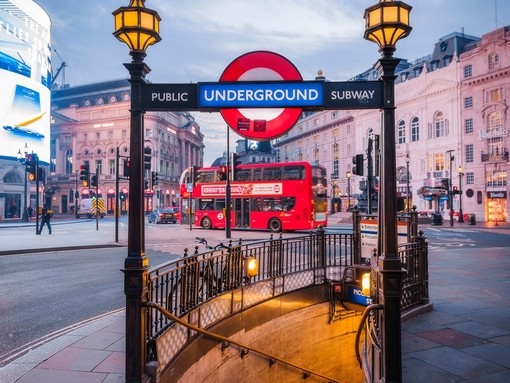
From palaces to cobbled alleys, and a dormant volcano, this city is a real show-stopper.
VisitBritain/Andrew Pickett

World-class football and a music scene that brought Oasis to centre stage – there’s lots to love about Manchester.
VisitBritain/Manchester Craft Beer Festival

A quirky seaside city filled with diverse cuisine, vintage shopping and adrenaline fuelled adventure.
VisitBritain/i360

From The Beatles to Frankie Goes to Hollywood, Liverpool is a UNESCO City of Music with seriously cool credentials.
Oh Me Oh My

Cool creative Bristol is a must-see for art, culture and action-packed adventure.
VisitBritain/Rod Edwards

Step into a land of castles, world-renowned rugby and a whole host of myths and legends.
VisitBritain/Ben Selway

Pushing the boundaries of art and culture and a heart that beats through its people.
VisitBritain/Tommy Ga-Ken Wan

An industrial hub with a vibrant, creative heart and a whole host of quirky adventures.
West Midlands Growth Company

Newcastle upon Tyne
Linked by no fewer than seven bridges, it's one vibrant place to visit.
Rich Kenworthy
Newcastle, England
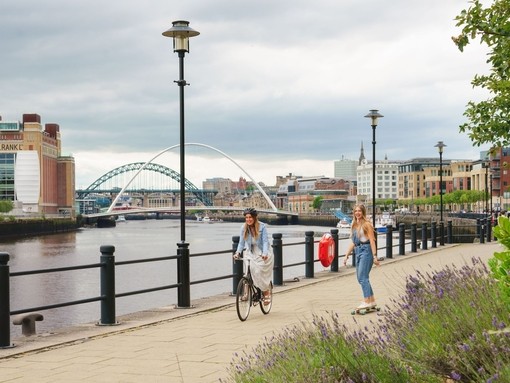
A hotbed for shopping and the arts, you’ll find lots to explore in Leeds.
VisitBritain/Thomas Heaton

Packed with lively pubs, an eclectic food scene and a myriad of immersive experiences.
Tourism Northern Ireland

Discover annual events
James Bridle

Celebrate in Britain
Find out what’s happening across the nations with our round-up of annual events.
Planning a trip? We're here to help
Your trip to england is just around the corner.
Discover the land of Big Ben, Banksy and bangers and mash. From its bustling cities to its blooming beautiful gardens, it doesn’t disappoint.
Discover Great Britain’s northern reaches
Imagine a country where ancient castles guard mysterious lochs and emerald glens, and where the local spirit is as warm as the welcome.
Discover a land of adventure and mythical creatures
Delve into a world of dragons, renowned choirs, championship rugby, and some of the most spellbinding scenery Britain has to offer.
Your trip to Northern Ireland has never looked more magical
Get swept up in a world of ancient myths and modern-day legends, from the Giant’s Causeway and Game of Thrones to the vibrant buzz of Belfast.
Follow us on Instagram
Update April 12, 2024
Information for u.s. citizens in the middle east.
- Travel Advisories |
- Contact Us |
- MyTravelGov |
Find U.S. Embassies & Consulates
Travel.state.gov, congressional liaison, special issuance agency, u.s. passports, international travel, intercountry adoption, international parental child abduction, records and authentications, popular links, travel advisories, mytravelgov, stay connected, legal resources, legal information, info for u.s. law enforcement, replace or certify documents.
Before You Go
Learn About Your Destination
While Abroad
Emergencies
Share this page:
United Kingdom
Travel Advisory July 26, 2023
United kingdom - level 2: exercise increased caution.
Reissued with obsolete COVID-19 page links removed.
Exercise increased caution in the United Kingdom due to terrorism.
Country Summary: Terrorist groups continue plotting possible attacks in the United Kingdom. Terrorists may attack with little or no warning, targeting tourist locations, transportation hubs, markets/shopping malls, local government facilities, hotels, clubs, restaurants, places of worship, parks, major sporting and cultural events, educational institutions, airports, and other public areas.
There is also a risk of isolated violence by dissident groups in Northern Ireland, focused primarily on police and military targets.
Read the country information page for additional information on travel to the United Kingdom.
If you decide to travel to the United Kingdom:
- Be aware of your surroundings when traveling to tourist locations and crowded public venues.
- Follow the instructions of local authorities.
- Monitor local media for breaking events and adjust your plans based on new information.
- Enroll in the Smart Traveler Enrollment Program ( STEP ) to receive Alerts and make it easier to locate you in an emergency.
- Follow the Department of State on Facebook and Twitter.com/Travelgov
- Review the Country Security Report for the United Kingdom.
- Visit the CDC page for the latest Travel Health Information related to your travel and return to the United States.
- Prepare a contingency plan for emergency situations. Review the Traveler’s Checklist .
Embassy Messages
View Alerts and Messages Archive
Quick Facts
Must be valid for the duration of your stay in the United Kingdom (If you have onward travel to countries outside the United Kingdom, you should check the passport validity requirements for each additional country on their respective information pages.)
Must have at least one page
Not required for stays less than six months.
Embassies and Consulates
U.s. embassy london.
33 Nine Elms Lane London, SW11 7US United Kingdom Telephone: +(44)(20) 7499-9000 Emergency After-Hours Telephone: +(44)(20) 7499-9000 Fax: +(44) (20) 7891-3845 Email: [email protected]
U.S. Consulate General Edinburgh, Scotland 3 Regent Terrace, Edinburgh EH7 5BW Scotland Telephone: 013-1556-8315 / from the United States: 011 (44)(13) 1556-8315 Emergency After-Hours Telephone: 020-7499-9000 / from the United States: 011 (44)(20) 7499-9000 Fax: 0131-557-6023 /from the United States: 011 (44) 131-557-6023 Email: [email protected]
U.S. Consulate General Belfast, Northern Ireland Danesfort House, 223 Stranmillis Road, Belfast BT9 5GR Northern Ireland, United Kingdom Telephone: 028-9038-6100 / from the United States: 011 (44)(28) 9038-6100 Emergency After-Hours Telephone: 01253-501106 / from the United States: 011 (44) 1253-501106 Fax: 028-9068-1301 / from the United States: 011 (44)(28) 9068-1301 Email: [email protected]
Destination Description
Learn about the U.S. relationship to countries around the world.
Entry, Exit and Visa Requirements
- To enter the United Kingdom, your passport must be valid for the entire duration of your planned stay.
- Starting June 2019, U.S. passport holders will be able to use the ePassport Gates upon arrival in the United Kingdom. U.S. citizens who had previously registered for the UK’s Registered Traveller Service (RTS) should now also use the ePassport Gates on arrival in the UK.
- If you are planning onward travel after departing the UK, note that many other countries require at least six months’ remaining validity on your passport to enter. If you are bound for Continental Europe, please see our U.S. travelers in Europe page for additional details.
- Visas for specific categories of visitors must be obtained prior to travel. Visit the UK Visas and Immigration (UKVI) website to determine if you need a visa to enter the United Kingdom. We cannot intervene on your behalf when you apply for a UK visa, nor can we advocate for your admission into the UK if you are denied entry.
- Students and prospective students should visit the UKVI website to determine if they need a visa.
- For some U.S. travelers, especially students, an entry stamp is required. Please consult this website for more information.
- Unpaid and paid workers, interns, volunteers, charity workers, and temporary workers can find information about obtaining a visa on the UKVI website .
- Visitors traveling to the United Kingdom to get married, even if they do not plan to reside there, must obtain a visa in advance. See the UKVI website for visa information.
- Surcharges apply to certain categories of visas, generally those involving work, study, or residency for more than six months. More information is available on the UKVI website and in our Health section below.
The U.S. Department of State is unaware of any HIV/AIDS entry restrictions for visitors to or foreign residents of the United Kingdom.
Find information on dual nationality , prevention of international child abduction and customs regulations on our websites.
Safety and Security
Terrorist groups continue plotting possible near-term attacks in Europe. The UK Security Service publishes specific reasons for any changes in the threat level and recommended actions for the public via its UK threat levels website .
There is the potential for isolated violence related to the political situation in Northern Ireland. The Police Service of Northern Ireland assesses there is a continued threat of violence from dissident groups in Northern Ireland, focused primarily on police and military targets, and may involve the use of firearms and explosives . Tensions may be heightened during the summer marching season (April to August), particularly on and around the July 12 public holiday.
Avoid areas of demonstrations if possible, and be careful within the vicinity of demonstrations. Demonstrations occur frequently in and around city centers and areas where tourists frequent. Even demonstrations intended to be peaceful can turn confrontational and possibly escalate to violence.
The phone number for police/fire/ambulance emergency services is 999 in the United Kingdom and 112 in Gibraltar. You should also use these numbers to report security threats or suspicious packages. Also see information for contacting police from abroad .
- Be cautious and aware of your surroundings.
- Be vigilant, as pickpocketing , mugging, and “snatch and grab” theft of mobile phones, watches and jewelry can occur.
- Do not leave bags unattended in restaurants, pubs, hotel lobbies, and parked cars.
- Be alert to other criminal schemes, such as impostors posing as undercover police officers and “fining” tourists for bogus minor offenses. A legitimate Metropolitan Police Services officer will never demand an immediate cash payment.
- Use only licensed Black Cabs or pre-ordered car services (minicabs) . Unlicensed taxis or private cars posing as taxis may offer low fares, but in some instances, travelers have been robbed or sexually assaulted while using these cars. See Transport for London for additional information on cabs and car services .
- Avoid using ATMs that look temporary in structure or location or are located in isolated areas – they may not be legitimate. Use ATMs located inside a bank branch.
Scams : Before sending any money to individuals you have never met in person, visit the Embassy London website for more information about internet financial scams and how to protect yourself.
See the Department of State and the FBI pages for information on scams.
Victims of Crime : Report crimes to the local police at 999 (United Kingdom) or 112 (Gibraltar) and contact the U.S. Embassy at +(44) (20) 7499-9000.
- Local authorities are responsible for investigating and prosecuting crimes.
See our webpage on help for U.S. victims of crime overseas .
- help you find appropriate medical care
- assist you in reporting a crime to the police
- contact relatives or friends with your written consent
- explain the local criminal justice process in general terms
- provide a list of local attorneys
- provide our information on victim compensation programs in the United States
- The Victim Support website is maintained by an independent UK charity to help people cope with the effects of crime
- A Northern Ireland-based independent charity maintains a similar victim support website
- In Scotland, victims of crime should contact Victim Support Scotland
- provide an emergency loan for repatriation to the United States and/or limited medical support if you are destitute
- help you find accommodation and arrange flights home
- replace a stolen or lost passport
Domestic Violence: U.S. citizen victims of domestic violence may contact the Embassy for assistance.
Tourism: The tourism industry is generally regulated and rules are regularly enforced. Hazardous areas/activities are identified with appropriate signage and professional staff is typically on hand in support of organized activities. In the event of an injury, appropriate medical treatment is widely available throughout the country. Outside of a major metropolitan center, it may take more time for first responders and medical professionals to stabilize a patient and provide life-saving assistance. U.S. citizens are encouraged to purchase medical evacuation insurance .
Local Laws & Special Circumstances
Criminal Penalties: You are subject to local laws. If you violate local laws, even unknowingly, you may be expelled, arrested, or imprisoned.
Furthermore, some laws are also prosecutable in the United States, regardless of local law. For examples, see our website on crimes against minors abroad and the Department of Justice website.
- You will be arrested if you bring pocket knives, blades, mace or pepper spray canisters, or any part of a gun into the United Kingdom . Please refer to the UK government publication Travelling to the UK , which details the items visitors are prohibited from bringing into the United Kingdom.
- Penalties against alcohol-related and other in-flight crimes committed aboard aircraft to and from the United Kingdom are stiff and are enforced with prison sentences . Please also see our information on U.S. customs regulations covering your return to the United States.
- Controlled Substances: UK law prohibits possession and trafficking of controlled substances and narcotics, including some substances that may be legal to possess under the law of certain U.S. states. More information on controlled substances is available here . Individuals who violate UK drug laws may face penalties including fines or prison sentences.
Arrest Notification: If you are arrested or detained in the United Kingdom, ask police or prison officials to notify the U.S. Embassy immediately. See our webpage for further information.
Special Circumstances:
- The legal drinking age in the United Kingdom is 18. Parents and organizers of school trips should read our Students Abroad website to help plan a safe and enjoyable experience.
- Scotland’s “drink drive limit” law was amended to a lower level (roughly .05 BAC) and is stricter than the rest of the United Kingdom (roughly .08 BAC). This means that driving after even one drink can result in a charge of driving under the influence.
- The United Kingdom has very strict gun control laws, and importing firearms is extremely complicated. Information on applying for a firearm and/or shotgun certificate can be found on the London Metropolitan Police Firearms licensing webpage . Licenses from England or Wales may not be valid in Scotland; please check with the appropriate authorities. For firearms certificates for Scotland, please check with Police Scotland .
Faith-Based Travelers: See our following webpages for details:
- International Religious Freedom Report – see country reports
- Human Rights Report – see country reports
- Hajj Fact Sheet for Travelers
- Best Practices for Volunteering Abroad
LGBTI Travelers: There are no legal restrictions on same-sex sexual relations or the organization of LGBTI events in the United Kingdom.
See our LGBTI Travel Information page and section 6 of our Human Rights report for further details.
Travelers Who Require Accessibility Assistance:
- UK law requires that all public service providers (except in the transportation sector) make “reasonable adjustments” to ensure their services are available to persons with disabilities. Nevertheless, code exemptions permit many older buildings to have steps up from the street.
- Getting around in cities may be difficult at times because sidewalks can be narrow and uneven.
- Most London Underground and UK National Rail System stations are not readily accessible for people with disabilities. Many stations do not have elevators, and have stairways and long corridors for changing trains or exiting to the street. Many UK buses are equipped with lowering platforms for limited-mobility or sight- or hearing-disabled travelers.
- Many taxis have swivel-entry seats or retractable ramps to ease entry.
- Disabled parking permits (known as “blue badges”) are issued by local government councils throughout the country. Visit the UK government website for contact information. Some councils may not offer permits to temporary visitors.
The Transport for London and National Rail websites provide information for passengers with disabilities.
Students: See our Students Abroad page and FBI travel tips .
Women Travelers: See our travel tips for women travelers .
While medical services are widely available, free medical care under the National Health System (NHS) is allowed only for UK residents, certain EU nationals, and some visa holders.
An NHS surcharge is assessed on certain visa applicants at the time of application. Tourists and short-term visitors will not be assessed the surcharge, but will be charged 150 percent of the cost of any medical treatment they receive from the NHS. Unpaid balances of £1,000 or more can result in being barred from return to the United Kingdom.
- The U.S. government does not pay medical bills, and U.S. Medicare is not valid overseas.
Medical Insurance: Make sure your health insurance plan provides coverage overseas . Most care providers overseas only accept cash payments . See our webpage for more information on insurance coverage overseas.
- We strongly recommend supplemental insurance to cover medical evacuation.
Carry prescription medication in original packaging, along with your doctor’s prescription. Traveling with sufficient supplies to last the duration of your trip is recommended. Mailing prescriptions is prohibitive and may be delayed or rejected by British customs.
Certain prescriptions available in the United States are classified as a "controlled drug" in the United Kingdom and cannot be brought into the country without applying for and obtaining a prior license. This includes prescriptions for medical marijuana or products containing CBD and THC. Please visit the https://www.gov.uk/travelling-controlled-drugs for additional information.
Vaccinations: Be up-to-date on all vaccinations recommended for international travel by the U.S. Centers for Disease Control and Prevention.
Further health information:
- World Health Organization
- U.S. Centers for Disease Control and Prevention (CDC)
Travel and Transportation
Road Conditions and Safety: Road conditions in the United Kingdom can differ significantly from those in the United States.
- In contrast to the United States, UK traffic drives on the left. Read the Highway Code before driving.
- Emergency call boxes (orange telephone booths with “SOS” printed on them) are found at half-mile intervals along motorways. White and blue poles point in the direction of the nearest call box. Call boxes dial directly to a motorway center. Use these phones rather than a personal cell phone, because motorway center personnel will immediately know your exact location.
- Generally, pedestrians do not have the right of way and should not expect vehicles to stop for them.
Many U.S. citizen pedestrians are injured, some fatally, every year in the United Kingdom, because they forget that oncoming traffic approaches from the opposite direction than in the United States. Exercise extra care when crossing streets; remain alert and look both ways before stepping into the street.
Traffic Laws:
- UK penalties for driving under the influence of alcohol or drugs are strict and often result in prison sentences .
- Using a hand-held cell phone or similar device while driving is illegal in the United Kingdom. Only hands-free phones may be used. You will be fined , or in the case of an accident, arrested and serve time in prison .
- The speed limit on highways/motorways in the United Kingdom is 70 mph, or lower when posted.
- You will be detained and arrested if you cannot provide a UK address to receive a subpoena or are about to depart the United Kingdom and have to be brought to court quickly for a motoring offense.
- In Central London, a congestion charge is levied on all drivers who pass through the congestion zone. You will be fined or arrested if you do not pay the charge. See Transport for London for more information about driving in London.
Public Transportation: Public transport in the United Kingdom is extensive.
- Information on disruptions to London transportation services can be found on the Transport for London website.
- Information about the status of National Rail Services can be found on the National Rail Enquiries website.
- Bus and train service information in Northern Ireland can be found on the Translink website.
- Bus and train service information in Scotland can be found on the Traveline Scotland website.
See our Road Safety page for more information. For specific information concerning UK driving permits, vehicle inspection, road tax, and mandatory insurance, refer to the UK Department for Transport website or the Driver and Vehicle Standards Agency website.
Aviation Safety Oversight: The U.S. Federal Aviation Administration (FAA) has assessed the government of the United Kingdom’s Civil Aviation Authority as being in compliance with International Civil Aviation Organization (ICAO) aviation safety standards for oversight of United Kingdom’s air carrier operations. Further information may be found on the FAA’s safety assessment page .
Maritime Travel: Mariners planning travel to the United Kingdom should also check for U.S. maritime advisories and alerts at www.marad.dot.gov/msci . Information may also be posted to the U.S. Coast Guard homeport website and the NGA broadcast warnings website (select “broadcast warnings”).
For additional travel information
- Enroll in the Smart Traveler Enrollment Program (STEP) to receive security messages and make it easier to locate you in an emergency.
- Call us in Washington, D.C. at 1-888-407-4747 (toll-free in the United States and Canada) or 1-202-501-4444 (from all other countries) from 8:00 a.m. to 8:00 p.m., Eastern Standard Time, Monday through Friday (except U.S. federal holidays).
- See the State Department’s travel website for the Worldwide Caution and Travel Advisories .
- Follow us on Twitter and Facebook .
- See traveling safely abroad for useful travel tips.
Review information about International Parental Child Abduction in the United Kingdom . For additional IPCA-related information, please see the International Child Abduction Prevention and Return Act ( ICAPRA ) report.
Travel Advisory Levels
Assistance for u.s. citizens, united kingdom map, learn about your destination, enroll in step.

Subscribe to get up-to-date safety and security information and help us reach you in an emergency abroad.
Recommended Web Browsers: Microsoft Edge or Google Chrome.
Check passport expiration dates carefully for all travelers! Children’s passports are issued for 5 years, adult passports for 10 years.
Afghanistan
Antigua and Barbuda
Bonaire, Sint Eustatius, and Saba
Bosnia and Herzegovina
British Virgin Islands
Burkina Faso
Burma (Myanmar)
Cayman Islands
Central African Republic
Cote d Ivoire
Curaçao
Czech Republic
Democratic Republic of the Congo
Dominican Republic
El Salvador
Equatorial Guinea
Eswatini (Swaziland)
Falkland Islands
France (includes Monaco)
French Guiana
French Polynesia
French West Indies
Guadeloupe, Martinique, Saint Martin, and Saint Barthélemy (French West Indies)
Guinea-Bissau
Isle of Man
Israel, The West Bank and Gaza
Liechtenstein
Marshall Islands
Netherlands
New Caledonia
New Zealand
North Korea (Democratic People's Republic of Korea)
Papua New Guinea
Philippines
Republic of North Macedonia
Republic of the Congo
Saint Kitts and Nevis
Saint Lucia
Saint Vincent and the Grenadines
Sao Tome and Principe
Saudi Arabia
Sierra Leone
Sint Maarten
Solomon Islands
South Africa
South Korea
South Sudan
Switzerland
The Bahamas
Timor-Leste
Trinidad and Tobago
Turkmenistan
Turks and Caicos Islands
United Arab Emirates
Vatican City (Holy See)
External Link
You are about to leave travel.state.gov for an external website that is not maintained by the U.S. Department of State.
Links to external websites are provided as a convenience and should not be construed as an endorsement by the U.S. Department of State of the views or products contained therein. If you wish to remain on travel.state.gov, click the "cancel" message.
You are about to visit:
Official websites use .gov A .gov website belongs to an official government organization in the United States.
Secure .gov websites use HTTPS A lock ( A locked padlock ) or https:// means you’ve safely connected to the .gov website. Share sensitive information only on official, secure websites.
- Search ITA Search
- Market Overview
- Market Challenges
- Market Opportunities
- Market Entry Strategy
- Aerospace and Defense
- Defense Equipment - United Kingdom
- Agricultural Sectors
- Electric Vehicles/Autonomous Technologies
- Financial Technology (FinTech)
- Design and Construction
- Medical Technology
- Information and Communication Technology
- Safety and Security
- Travel & Tourism
- Trade Barriers
- Import Tariffs
- Import Requirements and Documentation
- Labeling/Marking Requirements
- U.S. Export Controls
- Temporary Entry
- Prohibited & Restricted Imports
- Customs Regulations
- Standards for Trade
- Trade Agreements
- Licensing Requirements for Professional Services
- Distribution and Sales Channels
- Selling Factors and Techniques
- Trade Financing
- Protecting Intellectual Property
- Selling to the Public Sector
- Business Travel
- Investment Climate Statement
UK custom regulations are established by His Majesty’s Revenue & Customs (HMRC). HMRC is the UK’s tax, payments, and customs authority, and it collects money that pays for the UK’s public services. The HMRC lays out all of its general information for importers and exporters in the document titled ‘ UK Trade Tariff: Volume 1 ’, published on January 1, 2009 and periodically updated.
Value Added Tax, or VAT, is applicable on goods imported into (and exported out of) the UK, and is governed by the Value Added Tax Act 1994 (an act of Parliament (Westminster)), particularly Section 15 to Section 17 of this statute, which details the charge to the tax applicable in the case of ‘Imported Goods from Outside Member States’ (i.e., outside the EU). The VAT is charged as though it is a custom duty, and provisions in the Community Customs Code (from the European Economic Community) and the Customs and Excise Management Act 1979 apply while appropriating VAT in relation to imported goods.
The liability of VAT on goods is ascertained by assigning them ‘commodity codes’, which are again detailed in the ‘UK Trade Tariff: Volume 1’ from the HMRC.
On exportation, however, VAT is generally not applied, i.e., nil rate applied on VAT. Merely providing proof of export is enough for an export to be cleared. The rate of the VAT may increase or decrease, and Section 2(2) of the Value Added Tax Act 1994 grants Her Majesty’s Treasury (HM Treasury, or Treasury) the authority to decrease or increase the rate of VAT by 25% for a period of one year. See the HMRC’s guidance on VAT rates for further information.
Cookies on GOV.UK
We use some essential cookies to make this website work.
We’d like to set additional cookies to understand how you use GOV.UK, remember your settings and improve government services.
We also use cookies set by other sites to help us deliver content from their services.
You have accepted additional cookies. You can change your cookie settings at any time.
You have rejected additional cookies. You can change your cookie settings at any time.
Foreign travel advice
Get advice about travelling abroad, including the latest information on coronavirus, safety and security, entry requirements and travel warnings.
Countries or territories
226 Countries or territories
Countries starting with A
- Afghanistan
- Antarctica/British Antarctic Territory
- Antigua and Barbuda
Countries starting with B
- Bonaire/St Eustatius/Saba
- Bosnia and Herzegovina
- British Indian Ocean Territory
- British Virgin Islands
- Burkina Faso
Countries starting with C
- Cayman Islands
- Central African Republic
- Cook Islands, Tokelau and Niue
- Côte d'Ivoire
- Czech Republic
Countries starting with D
- Democratic Republic of the Congo
- Dominican Republic
Countries starting with E
- El Salvador
- Equatorial Guinea
Countries starting with F
- Falkland Islands
- Federated States of Micronesia
- French Guiana
- French Polynesia
Countries starting with G
- Guinea-Bissau
Countries starting with H
Countries starting with i, countries starting with j, countries starting with k, countries starting with l.
- Liechtenstein
Countries starting with M
- Marshall Islands
- Myanmar (Burma)
Countries starting with N
- Netherlands
- New Caledonia
- New Zealand
- North Korea
- North Macedonia
Countries starting with O
Countries starting with p.
- The Occupied Palestinian Territories
- Papua New Guinea
- Philippines
- Pitcairn Island
Countries starting with Q
Countries starting with r, countries starting with s.
- São Tomé and Principe
- Saudi Arabia
- Sierra Leone
- Solomon Islands
- South Africa
- South Georgia and the South Sandwich Islands
- South Korea
- South Sudan
- St Helena, Ascension and Tristan da Cunha
- St Kitts and Nevis
- St Martin and St Barthélemy
- St Pierre & Miquelon
- St Vincent and the Grenadines
- Switzerland
Countries starting with T
- Timor-Leste
- Trinidad and Tobago
- Turkmenistan
- Turks and Caicos Islands
Countries starting with U
- United Arab Emirates
Countries starting with V
Countries starting with w.
- Wallis and Futuna
- Western Sahara
Countries starting with Y
Countries starting with z, get updates for all countries, is this page useful.
- Yes this page is useful
- No this page is not useful
Help us improve GOV.UK
Don’t include personal or financial information like your National Insurance number or credit card details.
To help us improve GOV.UK, we’d like to know more about your visit today. We’ll send you a link to a feedback form. It will take only 2 minutes to fill in. Don’t worry we won’t send you spam or share your email address with anyone.

An official website of the United States government
Here’s how you know

Official websites use .gov A .gov website belongs to an official government organization in the United States.
Secure .gov websites use HTTPS A lock ( Lock A locked padlock ) or https:// means you’ve safely connected to the .gov website. Share sensitive information only on official, secure websites.

- Documents Library
El Paso International Airport (KELP) Fact Sheet Details
This airport fact sheet for El Paso International Airport (KELP) located in El Paso, Texas provides information regarding CBP procedures for general aviation aircraft operators arriving and/or departing from El Paso International Airport.
Russia, Germany, UK urge restraint as Iranian threat puts Middle East on edge
- Medium Text

'POTENTIAL FOR MISCALCULATION'
The Reuters Daily Briefing newsletter provides all the news you need to start your day. Sign up here.
Reporting by Ilona Wissenbach in Frankfurt, Shariq Khan in New York, Emily Chow in Singapore, and Simon Lewis and Steve Holland in Washington; Writing by Tom Perry, Ros Russell, Andrew Heavens and Stephen Coates; Editing by Kevin Liffey and Daniel Wallis
Our Standards: The Thomson Reuters Trust Principles. New Tab , opens new tab

World Chevron

Stabbed Sydney Assyrian church bishop says he forgives attacker
An Assyrian church bishop who was stabbed during a service at his church said on Thursday he was recovering quickly, and that he had forgiven his attacker as police ramped up investigation into the riots triggered after the bishop's stabbing.
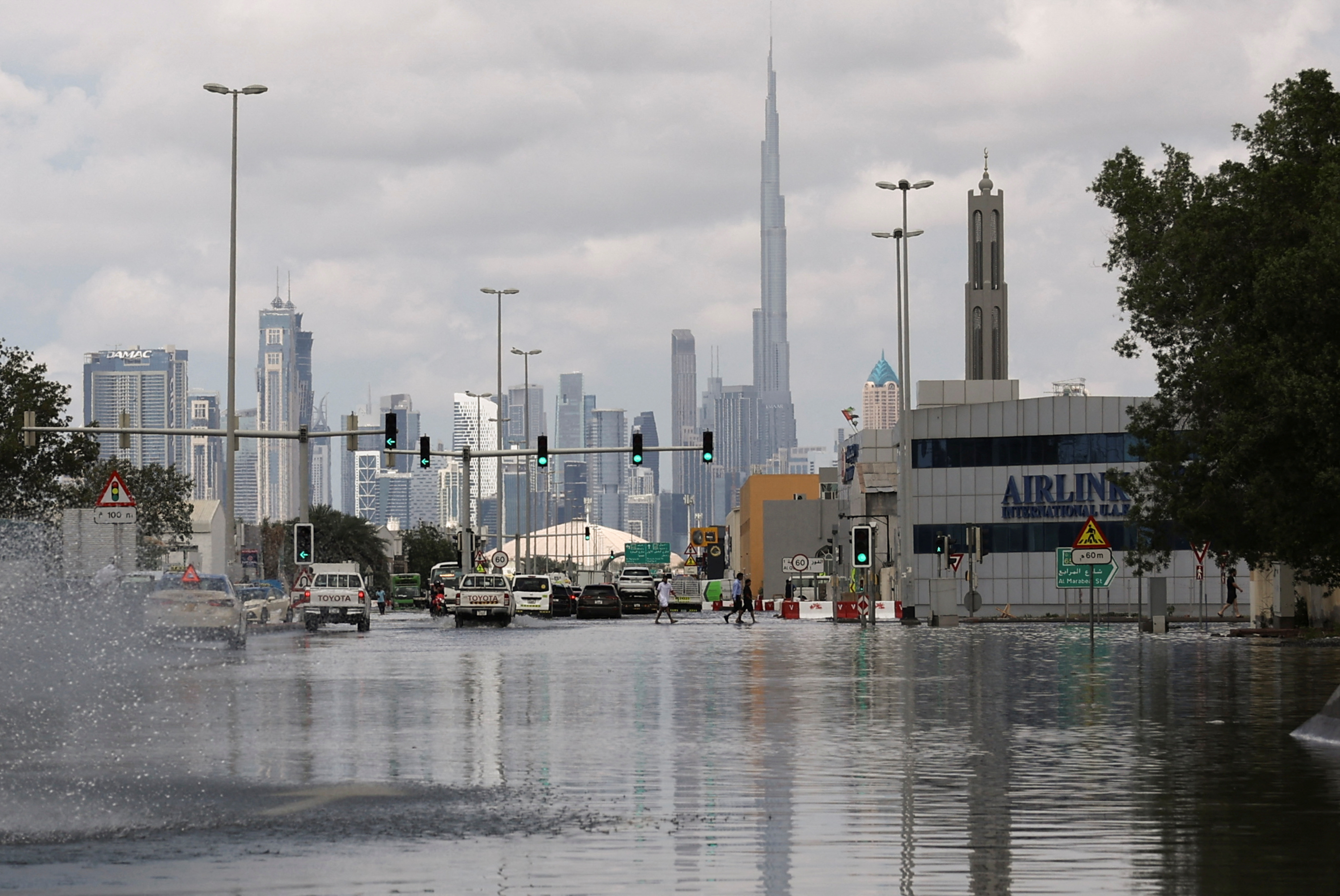

IMAGES
VIDEO
COMMENTS
This leaflet tells you about going through Customs when entering Great Britain (England, Scotland and Wales) in the United Kingdom (UK). There are different rules for travellers entering Northern ...
UK border control - passport checks, visas for entering, customs, transiting and layovers. ... You may also need a visa to come into or travel through the UK, depending on your nationality.
6.7005_BF - SE CUS GB leaflet. Contents. This leaflet tells you about going through. Customs when entering Great Britain. (England, Scotland and Wales) in the United. Kingdom (UK). There are different rules for. travellers entering Northern Ireland (NI), these. can be found on.
This leaflet outlines what you are allowed and not allowed to bring into the UK through Customs. Published 29 April 2013. Last updated 15 January 2024 + show all updates. Get emails about this page.
4 litres of still table wine. 1 litre of spirits or strong liqueurs over 22 per cent alcohol by volume, or 2 litres of fortified wine (such as port or sherry), sparkling wine or other liqueurs. ( As with the change in tobacco allowances, you can now make up your alcohol allowance from a mix and match of alcohol products.
UK Customs. On 1 January 2021, the UK left the European Union. Passengers continue to be able to use Heathrow to travel from the UK to the EU. There has been some changes at customs and the process of declaring goods. The blue channel (previously used for arrivals from EEA countries) has closed. All passengers arriving from the EU are required ...
You can bring a certain amount of alcohol into England, Scotland and Wales without having to pay tax or duty: 42 litres of beer and. 18 litres of wine (not sparkling) You can also bring either: 4 litres of spirits and liquor higher than 22% alcohol or. 9 litres of fortified or sparkling wine and drinks under 22% alcohol.
Pre-order UK attractions, tours and travel tickets before you arrive in the UK. Go to Shop. Visas and entry. Visa and immigration. Latest COVID-19 requirements. Book your trip; ... Find out about about passport requirements, what to expect at customs and immigration, as well as tips on travelling to Britain, getting around and some handy ways ...
1. Leave Time in Your Itinerary for Going Through Immigration. Depending on the time of day, sometimes immigration takes a long time. Again, this has sped up due to the e-Gates and the e-Gates usually take about 10 minutes to get through, but if you have to stand in line, it can be a bit of a wait. Especially if you fly into London Heathrow on ...
If you need assisted digital support to make your declaration call HMRC from 72 hours in advance of arrival on 0300 322 9434 (Mon - Fri 8am - 6pm). Make your declaration ahead of arrival where possible, however, outside these hours of service, please use the red point phone or red channel.
For further information on UK Customs & Excise, the duty free allowances and goods that are banned & illegal please see: UK Customs & Excise UK Embassies, High Commissions & Consulates For visitors coming to the UK, a useful source of information on UK entry requirements, including finding out if you need a visa for you holiday, business or ...
There are an abundance of study options in the UK. Study UK helps to provide you with practical information, scholarship and funding options as well as advice about moving to the UK. Find out practical information for your trip to the UK courteously of VisitBritain. Find details on electricity sockets, tips on using the internet, and more.
In the United Kingdom, customs duty is imposed on imported goods valued at more than £135 (~$170). This duty is assessed based on the fair market value of the goods upon their arrival in the UK. It's important to note that import prices typically include various costs such as insurance, freight, and duty. Additionally, a standard 20% Value ...
A government-issued passport is needed when entering the UK. You may also need to declare certain goods upon entry into the UK. Please see the governments advise on Entering the UK for more information. Includes information on business customs, travel advisory, visa requirements, acceptable business etiquette, dress, business cards, gifts, etc.
At border control. You'll need to show your identity document, such as your passport or national identity card. You must: If you're travelling from Ireland, Jersey, Guernsey or the Isle of Man ...
A Quick Introduction. During the tax year ending April 2023, the UK imported almost £900 billion worth of goods ( Department for International Trade) - a 17.9% increase on the previous year. Importing goods opens up opportunities for market expansion, product variety, and quality enhancement, ultimately economic growth and job creation.
VisitBritain - The official tourism website of Great Britain. Providing you with inspirational activities and experiences, from those in the know. Your guidance and information about travelling to Great Britain and Northern Ireland. Helping the travel industry showcase the best of Britain.
Call us in Washington, D.C. at 1-888-407-4747 (toll-free in the United States and Canada) or 1-202-501-4444 (from all other countries) from 8:00 a.m. to 8:00 p.m., Eastern Standard Time, Monday through Friday (except U.S. federal holidays). See the State Department's travel website for the Worldwide Caution and Travel Advisories.
UK customs and border control. When travelling to the UK from overseas, UK and EU adult citizens may get through passport control more quickly by using ePassport gates. Follow this link for general information on how to prepare for the UK border, such as having landing cards ready and who is eligible to use ePassport gates. You will also find ...
Therefore, for goods entering the UK from the EU from 1 January 2022 onwards, you will need to complete a Customs declaration by the time the goods reach the border. If your goods are travelling into the UK by Road, you will need to complete the UK pre-lodgement requirements before the goods arrive in the UK.
Last published date: 2023-11-03. UK custom regulations are established by His Majesty's Revenue & Customs (HMRC). HMRC is the UK's tax, payments, and customs authority, and it collects money that pays for the UK's public services. The HMRC lays out all of its general information for importers and exporters in the document titled ' UK ...
Up to $800 in goods will be duty-free if it is from a CBI or Andean country. Any additional amount, up to $1,000, in goods will be dutiable at a flat rate (3%). To take advantage of the Customs duty-free exemption for unaccompanied tourist purchases (mailing/shipping) from an IP or CBI country: Step 1.
Before crossing the UK border you must tell customs about ('declare') any goods: where you go over your allowances. that are banned or restricted. If you go over an allowance, you will have to ...
This airport fact sheet for Scottsdale Airport (KSDL) located in Scottsdale, Arizona provides information regarding CBP procedures for general aviation aircraft operators arriving and/or departing from Scottsdale Airport. Attachment. Attachment column arrow image representing sort order (up is ascending, down is descending, and up/down is unsorted.
While you're abroad. Help and services around the world. Claiming benefits if you live, move or travel abroad. Get your document legalised. Register a birth abroad. Get help if you're a victim of ...
Get advice about travelling abroad, including the latest information on coronavirus, safety and security, entry requirements and travel warnings.
El Paso International Airport Fact Sheet. PDF. 597.35 KB. 04/17/2024. Last Modified: Apr 17, 2024. This airport fact sheet for El Paso International Airport (KELP) located in El Paso, Texas provides information regarding CBP procedures for general aviation aircraft operators arriving and/or departing from El Paso International Airport.
Russia, Germany and Britain on Thursday urged countries in the Middle East to show restraint and Israel said it was preparing to "meet all its security needs" in a region on edge over an Iranian ...